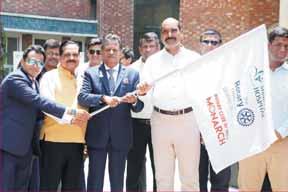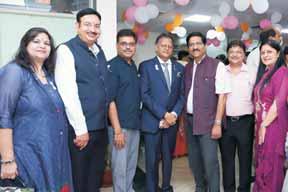







Meet the new RI President Mark Maloney and his wife Gay.














Meet the new RI President Mark Maloney and his wife Gay.





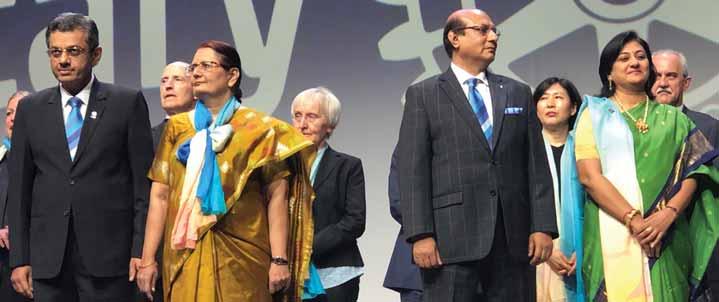
Above: (From L) RIDE Bharat Pandya, Madhavi, RIDE Kamal Sanghvi and Sonal being introduced at the Hamburg Convention.
Right: Change-over ceremony: RID C Basker accompanies the incoming directors Kamal Sanghvi and Bharat Pandya to the RI Board.
Below: TRF Trustees being introduced at the convention. PRIP K R Ravindran, Vanathy and Gulam Vahanvaty are seen in the picture.
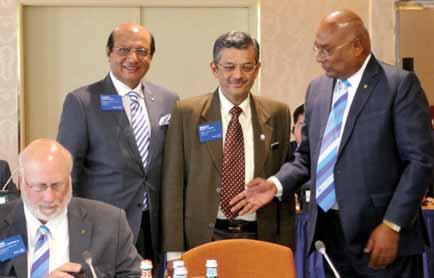
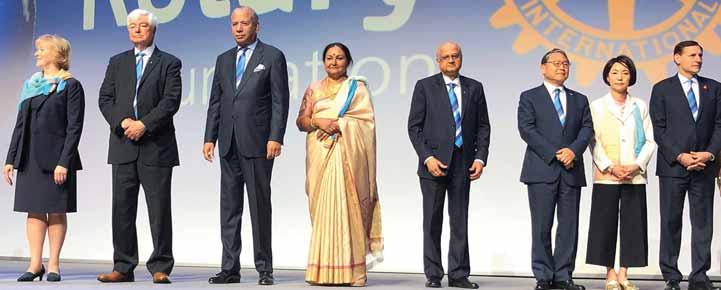
12 The Past is Prologue
Read about the new RI President’s life and priorities.
22 Rotary Group Study Exchange programme was a life-enhancing experience
An interview with TRF Trustee GulamVahanvaty.
30 South Asian Rotarians doing exemplary work: President Barry Rassin President Rassin compliments Indian Rotarians at the S Asia Reception at Hamburg.
42 Memorable moments from Hamburg Highlights of the 110th Rotary Convention at Hamburg.
58 Karnataka Rotarians on a mission to green the Earth
RC Bangalore Orchards launches a one crore saplings plantation programme in Bengaluru.
64 Meet your Governors
Get to know your governors and their plans.
72 Word games are good medicine
Crosswords, sudoku and word search keep the mind sharp and active.
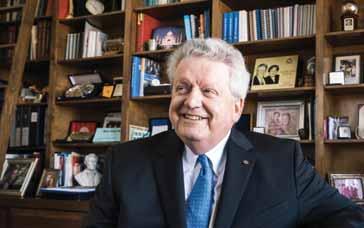


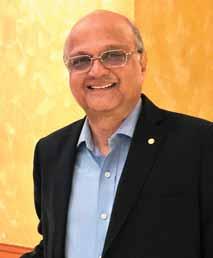

78 The Mind-Body connection in exercise




The mind urges the body to exercise effectively; exercise improves brain function.





42 On the cover: RI President Mark Maloney and his spouse Gay. Picture by Cary Norton, The Rotarian





The Editor’s Note on Sending Sundara to school is apt, timely and interesting as the academic year has just started and the help and encouragement that she received is laudable.
Also, glad to read the interviews of incoming RI Directors. RI President Barry Rassin’s parting message is brief but impressive and useful as it gives details about the services rendered by Rotarians and Rotary peace fellows. The parting message from RID C Basker shows his satisfaction in serving Rotary during his tenure.
RIDE Bharat Pandya’s thoughts on the three phases of human life — learn, earn and return — are exemplary. His vision for future including free health check-up for schoolchildren is a novel idea which needs to be promoted.
interview with RIDE Kamal Sanghvi is superb and his vision of Rotary getting a Nobel Prize has to be appreciated by all Rotarians. My homage to Kris Chitale who was a Rotarian of RC Madras for 54 long years.
All other articles are nice and the club activity reports with colourful photos (Club Matters) are exemplary.
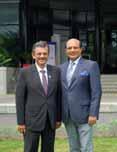
My homage to Rtn Kris Chitale, a role model for the new generation of Rotarians. It is only befitting that such a fitting tribute has been given in Rotary News in his honour. The entire Rotary world will remember him for his contribution in polio eradication, apart from services like setting up of vocational training


Congrats for sustaining the quality of the magazine. Hope you will bring in more diversified ideas and subjects in cooperation with eminent Rotarians in future.
M T Philip, RC Trivandrum Suburban — RID 3211
One more “interesting to read issue” and one more interesting Editorial from Rasheeda.
We are happy to note that now there are two RI Directors in India to handle the issues of zones more effectively. The centres. More than anything else, what was touching to know was his polite refusal to contest for the post of district governor, as we have been told by Rajendra Saboo. We will rarely find such Rotarians among us who can really take Rotary as ‘service above self’ and shun positions of power. Let all of us salute the
Just as the two incoming RI Directors look at their role in Rotary “not as positions of
power” but of responsibility, I wish that every club president and district governor do the same. Instead of being called “ruling presidents or ruling governors”, they they should act as “serving presidents and governors”. Their mindset should change to be humble in spite of the hype being created around them.
Not only at the top level in the capital but also in the states and the municipalities, our Rotary leaders must work handin-hand with the government and get their support. They should be made aware of the fact that we are here to help in lifting the living conditions of our fellow citizens in our communities. Rasheeda’s Editorial continues to make a difference.
Nan Narayenen, RC Madurai West — RC 3000
departed soul for his unstinted dedication to both Rotary and humanity. May his soul rest in peace.
Dr NRUK Kartha RC Trivandrum Suburban — RID 3211
AnewRotary year begins in July. Looking back, Rotary News had excelled every month with inspiring
articles and content in the past year.
In the June issue, RID C Basker’s message A Big Thank you was fantastic. Rasheeda’s interview of RIDE Bharat Pandya titled Rotary continues to expand my horizon was superb. A Rotarian’s dream creates a `8 crore-housing project for Irulas in Tamil Nadu by V Muthukumaran was inspiring to all Rotarians.
The article A village comes to life was nicely written. I wish all Rotarians a happy Rotary year 2019–20.
Daniel Chittilapilly RC Kaloor — RID 3201
The May issue Editorial on celebrating our democratic process is truth presented in a lively manner. This time the citizens of India have truly felt the beauty of democracy. Rotarians contesting the election and coming out victorious will realise the importance the 4-Way-Test in their execution of policies. The ballot box wisdom was the need of the hour for the voters and they really proved themselves the best in the world in selecting a stable government.
The period of abusive language and invectives is over and decency will rein in the coming days, we hope. Three cheers for democracy.
Arun Kumar Dash RC Baripada — RID 3262
The cover page of the May issue, carrying a picture of RIPE Mark Maloney and his wife Gay is impressive. The article A journey from a “happy Rotarian” to a serious man by Rasheeda Bhagat
tells us how Rotary transforms the life of a common man as shared by RID C Basker. He tells us that when he became club president, the new responsibility to serve the community made him a worried man, which is only natural.
It is heartening to note how Indian doctors have served the needy patients in Madagascar, changing their lives and delivering service beyond borders. It is great to read that RI President Barry Rassin also rendered service as volunteer in this medical mission.
I felt privileged to interact and share golden moments with RID Bharat Pandya at District Training Assembly, RID 3090, in Chandigarh where he gave a motivational speech on leadership qualities.
Naveen R Garg RC Sunam — RID 3090
A timely article
The April issue is interesting to read with a nice collection of articles. I find the magazine very useful especially for women and children on issues related to health and their general welfare. All the articles and pictures are
noteworthy and create an impact among Rotarians.
Sudhir Kumar Garg
RC Muzaffarnagar — RID 3100
The article Celebrating 31 years of Women in Rotary by Jaishree in the May issue was timely. I joined RC Rourkela in 1990 as its first woman member. There were very few female Rotarians in our district then.
As a third generation past president (my grandfather and father were both PPs), I took to Rotary as a duck takes to water. During my 29-year-Rotary service, I have observed that women make excellent Rotarians as they bring empathy, compassion, new ideas and patience to the projects. Gender diversity is now rightly encouraged by Rotary International.
Had I known about the Inspire 2k19 Conclave held at Kochi recently, I would have definitely attended it. In my present club, women are in majority and we undertake a number of projects as per RI guidelines.
As an RLI graduate, whenever I take sessions on Rotary leadership, I always stress on
improving women membership.
But in my travels across India, when I often attend Rotary club meetings, I still find many clubs without a single woman member. I do hope more women come forward and join Rotary to strengthen this wonderful organisation.
Anjana Maitra
RC Rourkela Steel City — RID 3261
Your Editor’s Note on Educating a girl is like opening a school (Feb issue) is very true. Mother is the first teacher of a child and if we can educate a woman she can educate her family. The progress of a country depends on the literacy level of its women. We have to educate our girl children and make the environment in schools conducive for their education by providing gender-based toilets, desks and benches to sit and study, library and safe drinking water. We also need to educate parents and create awareness among them to educate their girl children.
Aswini Kar
RC Bhubaneswar Meadows — RID 3262
We welcome your feedback. Write to the Editor: rotarynews@rosaonline.org; rushbhagat@gmail.com Click on Rotary News Plus in our website www.rotarynewsonline.org to read about more Rotary projects.
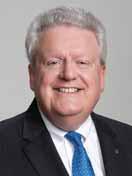
Dear fellow Rotarians and members of the family of Rotary,
Ilove to travel! I even enjoy the mundane process of getting from here to there. But last year, my wife, Gay, and I had one of those experiences that would strain the optimism of even the most cheerful traveller. We found ourselves with six hours to wait, at an airport where we were not scheduled to be, on a day we had not planned still to be travelling, having woken up that morning at a hotel unknown to us the night before. It was one of those days.
As we waited at John F Kennedy International Airport in New York City, Gay and I took a walk to people watch. We went from one end of the terminal to the other and back, looking at every gate, every destination, every group of people waiting for their flights.
Each gate was its own island of humanity. When we walked down the centre of the concourse, we were in New York, moving along with everyone in one river. But when you veered off into those seats, you left that current and landed on an island. You were already in Delhi or Paris or Tel Aviv.
As we started our walk, I thought: “All these different people, all these different countries, all in one place. This is like Rotary!” But as we walked past gate after gate, I realised something. It was not

like Rotary at all. Because everyone in that river was heading for an island. And every island stayed an island. The people heading to Taipei might be talking to one another, but they were not talking to the people heading to Cairo or Lagos.
Contrast that with Rotary. Rotary allows us to connect with one another, in deep and meaningful ways, across our differences. It connects us with people we would never otherwise have met, who are more like us than we ever could have known. It connects us with our communities, to professional opportunities, and to the people who need our help.
Connection is what makes the experience of Rotary so very different from walking along that concourse at JFK Airport. In Rotary, none of us is an island. All of us are in Rotary together, whoever we are, wherever we are from, whatever language we speak or traditions we follow. We are all connected to one another — part of our communities and members not only of our clubs, but also of the global community to which we all belong.
This connection is what lies at the heart of the Rotary experience. It is what brings us to Rotary. It is why we stay. Please join your fellow Rotarians on this journey as Rotary Connects the World.
Mark Daniel Maloney President, Rotary International

If any evidence was required of Rotary International really embracing youth energy, enthusiasm and leadership, and walking the talk when it comes to making Rotaract a member of RI through the recent CoL resolution, it was amply evident at the Hamburg Rotary Convention. Every senior RI leader, including RI President Barry Rassin, incoming President Mark Maloney and Trustee Chair Brenda Cressey, reiterated in their speeches how important Rotaractors were for Rotary’s quest in making our world a better place for diverse groups of people... President Rassin and the organising committee of the convention ensured that not only the opening session, but all the plenaries and many of the breakouts featured the exemplary work done by the young. Whether it was the young artist, Jamaal Rolle who did a breathtaking live painting of oral polio drops being administered to a child, which was later auctioned, or Dr Pia Skarabis-Querfeld, a Rotarian who has helped thousands of Syrian refugees in Berlin by building an amazing network of volunteer doctors to treat sick refugees, the convention celebrated youth leadership.
That India is holding a beacon to the Rotary world was reiterated by none less than President Rassin himself who addressed the conventional South Asia Reception in Hamburg where Rotarians from India, Sri Lanka, Nepal, Pakistan and Bangladesh were represented. That RI has a lot of expectations and aspirations from this region could be seen from the reception attracting the who’s who of RI’s present and past senior leaders, including RI presidents, directors and trustees.
It was a proud moment for South Asian Rotarians when Rassin complimented them for great service projects and said: “We can’t thank you enough for what you’re doing. Not only does South Asia have the fastest growing membership in the Rotary world, I also believe that this region can be No 1 in giving to our Foundation. You can do it... you have the generosity, the spirit and the ability to do things that inspires the rest of the world.” But the last mile in polio eradication needs to be covered, and while Nigeria was on the verge of being declared polio-free, Pakistan and Afghanistan continued to face challenges. And till this region was polio-free, Rotarians of the world can’t take their eye off the goal. Rotary has made a promise to the children of the world and “we have to and will keep this promise,” he added.
The persistent, persuasive and dedicated work done by PRIP Rajendra Saboo and Usha came in for a special mention not only at this reception, but also in one of the plenary sessions with the RI President saying a “special thank you” to Saboo and Usha for “the amazing work they continue to do.”
And now a Johns Hopkins University report estimates that the value of the 45 million volunteer service hours that Rotarians put in every year is around $850 million! As a new Rotary year begins, what greater encouragement can you ask for to charge your batteries and put wind in your sails to make an even bigger impact in the communities you inhabit? The challenges are only getting bigger on all fronts, but every single humanitarian project you do makes a dent in those challenges.
Rasheeda Bhagat
RI Dist 2981 DG N Manimaran
RI Dist 2982 DG Natesan A K
RI Dist 3000 DG Dr A Zameer Pasha
RI Dist 3011 DG Suresh Bhasin
RI Dist 3012 DG Deepak Gupta
RI Dist 3020 DG M Veerabhadra Reddy
RI Dist 3030 DG Rajendra Madhukar Bhamre
RI Dist 3040 DG Dhiran Datta
RI Dist 3053 DG Harish Kumar Gaur
RI Dist 3054 DG Bina Ashish Desai
RI Dist 3060 DG Anish Shah
RI Dist 3070 DG Sunil Nagpal
RI Dist 3080 DG Jitendra Dhingra
RI Dist 3090 DG Rajeev Garg
RI Dist 3100 DG Hari Gupta
RI Dist 3110 DG Kishor Katru
RI Dist 3120 DG Sanjay Agrawal
RI Dist 3131 DG Ravee Dhotre
RI Dist 3132 DG Suhas Laxmanrao Vaidya
RI Dist 3141 DG Harjit Singh Talwar
RI Dist 3142 DG Dr Mohan Chandavarkar
RI Dist 3150 DG Pandi Sivannarayana Rao
RI Dist 3160 DG Nayan S Patil
RI Dist 3170 DG Dr Girish R Masurkar
RI Dist 3181 DG Joseph Mathew
RI Dist 3182 DG Ramesh B N
RI Dist 3190 DG Dr Sameer Hariani
RI Dist 3201 DG R Madhav Chandran
RI Dist 3202 DG A Karthikeyan
RI Dist 3211 DG Shirish Kesavan
RI Dist 3212 DG S Sheik Saleem
RI Dist 3231 DG Sridar Balaraman
RI Dist 3232 DG G Chandramohan
RI Dist 3240 DG Dr Debasish Das
RI Dist 3250 DG Gopal Khemka
RI Dist 3261 DG Ranjeet S Saini
RI Dist 3262 DG Debasish Mishra
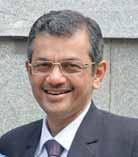
ARI Dist 3291 DG Ajay Agarwal One-to-One
Printed by P T Prabhakar at Rasi Graphics Pvt Ltd, 40, Peters Road, Royapettah, Chennai - 600 014, India, and published by P T Prabhakar on behalf of Rotary News Trust from Dugar Towers, 3rd Flr, 34, Marshalls Road, Egmore, Chennai 600 008. Editor: Rasheeda Bhagat.
The views expressed by contributors are not necessarilythoseoftheEditororTrusteesofRotaryNews Trust (RNT) or Rotary International (RI). No liability can be accepted for any loss arising from editorial or advertisement content. Contributions – original content –are welcome but the Editor reserves the right to edit for clarity or length. Content can be reproduced, but with permissionfromRNT.
torchbearer is one who carries a torch, someone at the forefront of the path, a person who inspires others in working towards a common, valued goal. In 2019–20 we Rotarians will be Torchbearers. Today, the world needs Rotary more than ever. The needs are greater, more diverse and so are the challenges. As Rotarians, we can Lead The Way to meet them. We can connect with the world by our Grow Rotary initiative; by growing our Rotary Fellowship, our Membership, our Leadership and our Service. And we must focus on our Family. We have to ensure that Rotary grows with and not at the expense of our family.
Our clubs are where the good work of Rotary happens. The true strength of Rotary is the Rotarians working sincerely in their clubs and communities. I salute the Rotarians of our Zones for the good work that they do. I am certain that each of you will do your bit and do it as best as you can in 2019–20.
The power to Act is within you. Use it. Remember two things when you act;
* Act with Love: I remember the shout of joy from an old woman whose sight was restored by cataract surgery sponsored by Rotary, when she saw her little granddaughter for the first time. That is love in action. Make your love shine through your Rotary service.
* Act with Integrity: Our ancient texts say: “the only thing that walks back from the tomb and refuses to be buried is the character of a man; what a man is, his character outlives him, it can never be buried.”
I compliment outgoing RI Director C Basker for his leadership and service to Rotary in our Zones in 2017–19. And I look forward to working closely with RID Kamal Sanghvi during 2019–21.
Madhavi joins me in wishing all the Rotary families in our zones the very best and Godspeed in this new journey.
Be the Torchbearers as Rotary Connects the world. Enjoy Rotary. Enjoy yourself.

Dr Bharat Pandya
RI Director,
Zones 4 and 7
My Dear Rotarians, I am proud that each day, our members pour their passion, integrity and intelligence into completing projects that have a lasting impact. We persevere until we deliver real, lasting solutions.
Over 110 years, we’ve bridged cultures and connected continents to champion peace, fight illiteracy and poverty, promote clean water and sanitation, and fight diseases.
We are resolved to rid the world of polio forever. There is no greater glory than to finish the race; so let’s make the final push for a polio-free world.
Our President Mark Maloney is urging leaders to grow Rotary by creating new Rotary and Rotaract clubs that take advantage of innovative membership models “so that we can achieve more.”
We roll out Rotary’s strategic plan this year which ensures that our future is as strong as our past, ensuring that we continue to be known as a respected, dynamic organisation that advances communities worldwide. The plan unifies the direction of both RI and TRF and identifies three strategic priorities supported by 16 goals including supporting and strengthening
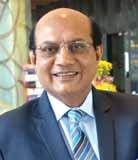
clubs, increasing humanitarian service and enhancing public image.
This year we celebrate 100 years of Rotary in India. The spotlight of Rotary fraternity will be on India and I am confident that Rotarians across India are inspired and motivated to do service activities like never before.
It is a year that should see new heights in all aspects of Rotary in India; sustained growth in membership, a surge in TRF contributions and bigger, better and sustainable projects. We will have to dream big and set our goals high and then work tirelessly to achieve those goals.
District governors have already set unprecedented high goals, but friends, the real work will happen at the club-level. Each one of you will make Rotary’s 100th year in India an outstanding year. This is our year to show to the Rotary world the shining star that India is.
Alone I can only say,
But together we can shout,
Alone I can only smile,
But together we can laugh,
Alone I can only live,
But together we can celebrate
And Connect the World.

Kamal Sanghvi RI Director, Zones 5 and 6
Board of Permanent Trustees & Executive Committee
PRIP Rajendra K Saboo RI Dist 3080
PRIP Kalyan Banerjee RI Dist 3060
PRID Sudarshan Agarwal RI Dist 3011
PRID Panduranga Setty RI Dist 3190
PRID Sushil Gupta RI Dist 3011
PRID Ashok Mahajan RI Dist 3141
PRID Yash Pal Das RI Dist 3080
PRID Shekhar Mehta RI Dist 3291
PRID P T Prabhakar RI Dist 3232
PRID Dr Manoj D Desai RI Dist 3060
PRID C Basker RI Dist 3000
TRF Trustee Gulam A Vahanvaty RI Dist 3141
RID Dr Bharat Pandya RI Dist 3141
RID Kamal Sanghvi RI Dist 3250
Executive Committee Members (2019–20)
DG Deepak Gupta RI Dist 3012
Chair – Governors Council
DG Nayan Patil RI Dist 3160
Secretary – Governors Council
DG Dhiran Datta RI Dist 3040
Secretary – Executive Committee
DG Ajay Agarwal RI Dist 3291
Treasurer – Executive Committee
DG Rajendra Madhukar Bhamre RI Dist 3030
Member – Advisory Committee
Assistant Editor Jaishree Padmanabhan
NEWS / ROTARY
ROTARY NEWS TRUST 3rd Floor, Dugar Towers, 34 Marshalls Road, Egmore Chennai 600 008, India. Phone : 044 42145666 e-mail: rotarynews@rosaonline.org Website :www.rotarynewsonline.org
NiveshGuru, a one-stop solution for all your investment needs.


For nearly 40 years, Mark Daniel Maloney and his family have demonstrated that Rotary connects the world. Now the selfdescribed ‘cheerful traveller’ embarks on the next phase of his life’s journey: serving as Rotary International’s new President.

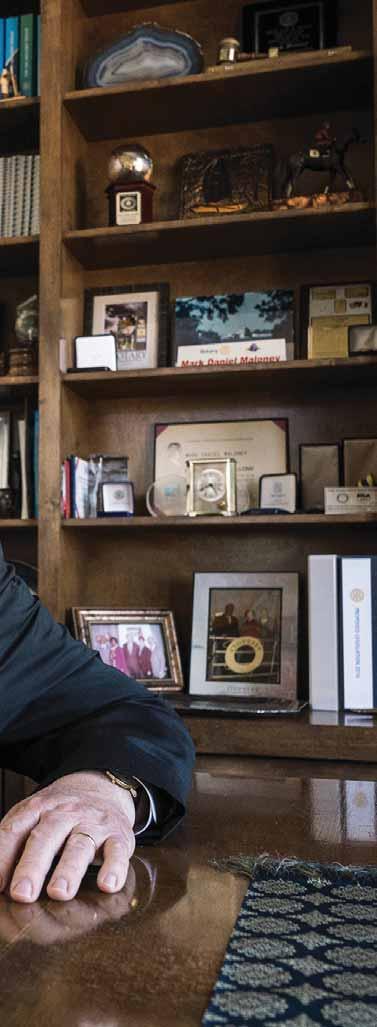
It’s two weeks before Christmas in northern Alabama, and the Rotary Club of Decatur is in full Yuletide mode. Last Saturday, working alongside members of the Church at Stone River, the club members treated more than 70 children to a pancake breakfast and a shopping trip to Target. Now at the club’s Monday meeting, the Austin Junior High jazz band is rocking the seasonal songs: “Santa Baby,” “Feliz Navidad,” “Baby, It’s Cold Outside” — though with temperatures nudging up against 40 degrees Fahrenheit, it feels, for early December, borderline balmy.
Once the band wraps up, Club President Larry Payne announces, “Now, back by unpopular demand: Where in the world is Mark?” The crowd hoots and hollers with amiable scorn. The man in question strides to the front of the room and proudly declares, “Mark Maloney is in Decatur, Alabama!” Some 120 people cheer wildly. Hail to the chief.
In its coverage of the Rotary-sponsored shopping trip, the Decatur Daily had quoted Maloney and called him a “club member,” which, while not inaccurate, was inadequate in that it failed to capture the breadth of the man’s accomplishments. Since joining Rotary in 1980, Maloney has served as (deep breath)
district governor, RI director, presidential aide, Rotary Foundation trustee, and chair of the Council on Legislation and the 2014 Sydney Convention Committee — and that’s only a few of the offices he has held, all of them prologue to his new leadership role: President of Rotary International.
“He’s so qualified to be RI President,” says Bill Wyker, who has known Maloney for nearly 40 years. “He’s a great communicator and has a brilliant mind; he’s compassionate and cares about people. I mean, you’ve got the whole package. Nobody in our club is surprised at him going all the way to the top of the mountain.”
Wyker, who succeeded Maloney as president of the Decatur club in 1986, lays claim to starting the club tradition of playfully teasing his predecessor. “I spawned the original Give Mark a Hard Time culture within our club, which is still alive and thriving today,” he says. “And Mark embraced that; he encouraged it. It became his mode of operating. The club loves it — and of course you don’t kid somebody like that unless you really love them and respect them.”
Speaking from the lectern at that December meeting, Maloney, who has described himself as “the most cheerful traveller,” explains where in the world he has been of late.
He describes a global jaunt that began with his “going east by way of Nevada and California” — and thence to England, India, Singapore, Indonesia, and Taiwan, before finally flying home to Decatur. But Maloney’s longer journey to this particular place and point in time actually began long ago in a country that, a century before passenger jets, lay far, far away.
With three young children to feed and the prospect of rich farmland across the Atlantic, Arthur and Catherine Maloney left Ireland in 1849 in the midst of the Great Famine and sailed for the United States (The couple left behind two older children, one of whom they would never see again). After landing in New Orleans, they travelled north to Gallatin County in southern Illinois. They landed in a place called Pond Settlement, where they made their home among other Irish Catholic immigrants.
Mark Daniel Maloney was born 106 years later,
on May 14, 1955. By then, the family farm, situated outside the small town of Ridgway, had grown to 1,200 acres. For decades the family had raised beef cattle and grown cattle feed, but Patrick Maloney (Mark’s father) and his two brothers shifted the focus to growing corn, wheat and soybeans. They also more than doubled the farm’s size when they bought an additional 1,500 acres across the Ohio River in Kentucky.
This was the environment in which Mark Maloney grew up, though it quickly became obvious he was not destined for a career in agriculture. At 4-H competitions, the proving ground for future farmers, he would walk away with top honours — for public speaking. His 1966 speech, “A Dream Becomes a Goal,” won the blue ribbon at the Illinois State Fair. Two years later, he won the county spelling bee by properly spelling “bludgeon”; two years after that, he was president of the Gallatin County 4-H Federation. And then there was the achievement against which all others paled: In 1962,
Mark and I can practise law together, and we can raise our family together. But there is no Rotary club in the world that is big enough for both of us.
Gay Maloney
Maloney and his five-yearold sister, Kristi, won the Hawaiian-themed costume contest at Ridgway’s annual Popcorn Day.
In Ridgway, the self-proclaimed Popcorn Capital of the world, there was no grander occasion than Popcorn Day, held each year on the second Saturday in September. “Popcorn Day was the town’s annual highlight,” says former Ridgway resident Rick Rotramel, a member of the Rotary Club of Danville, Illinois. Following a free movie at the Strand and a parade, children gathered at the bandstand for popcorneating, bubblegum-blowing, and frog-jumping contests.
Winners took home a silver dollar.
At 1 pm, the “mammoth float and band parade” would step off on Main Street; it featured what the local newspaper described as the “Popcorn Queen and her court, bands, floats, drill teams, motor patrols, horses, modern farm equipment, and Numerous Other Outstanding Entries!” After the tractor pull — “ITPA rules will apply” (for the uninitiated, that’s Illinois Tractor Pulling Association) — the rest of the day was devoted to musical entertainment, everything from Grand Ole Opry to spirituals and gospel music to something called “Teen-A-Go-Go.”

That kind of event needs a master of ceremonies, and in 1981 Ridgway turned to Maloney to handle that responsibility. He has performed the role every year since but twice: when it coincided with the baptism of his daughter Phyllis, and when he attended a funeral. “That’s a weekend” — it’s now known as Popcorn Days — “that’s inviolate on my calendar,” says Maloney, whose licence plate reads PPCRN.
“Mark hams it up and jokes around,” says Rotramel, who has helped emcee the parade since the mid-1990s. “He’s got a good sense of humour. He’s going to get the job done,
but he’s going to have fun doing it.”
Rotramel continues:
“Mark and I have the same feeling about our hometown. We’re very proud of it. Every year they call and ask if we’ll emcee. I say, ‘You don’t have to call. We will never stop doing this until the day we die.’ ”
In 1968, as he prepared to graduate from eighth grade, Maloney applied to Chaminade, a Catholic prep school in St Louis.
The school offered him a full scholarship, but his parents turned it down: Chaminade was a boarding
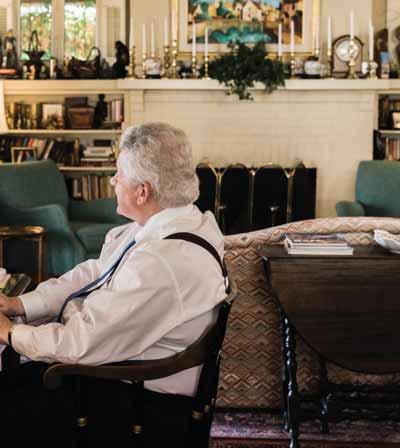
To this day I still refer to him as Mr Ambassador. He was very good with people and picking up on and understanding their culture.
Mike Curl, a GSE team member
school, and they weren’t ready to let their son go. Instead they promised to send him to the best college he could get into — as if a kid like Maloney needed any more motivation.
Instead of Chaminade, Maloney attended Ridgway High School, where his mother, Doreen, taught English. “She was a lot of fun and a hell of a teacher,” recalls Rotramel, who was a year ahead of Maloney. “Everybody liked her.”
As usual, Maloney excelled, and not just academically. He held a number of offices, including president of the student council and member of the student-faculty committee on school policy. While maintaining a prominent role in 4-H, he also was active in the band, chorus, newspaper, yearbook, Spanish club, and the National Beta Club — an academic honours society that promotes good ethical and moral behaviour — where he was a state officer. At graduation he delivered his class’s valedictory address. His classmates went out on a limb and voted him “most likely to succeed.” In 1972,
the year he graduated from Ridgway High, Maloney was recognised as Outstanding Catholic Youth of the Year in his 28-county diocese.
That fall, Maloney left for college. His parents had kept their promise to send him to the best school he could get into: Harvard. During the spring semester of his freshman year, Maloney, who would earn a degree cum laude in history, took a noncredit course that examined the nuts and bolts of state government. The instructor was Illinois politician Paul Simon, who was spending the year as a fellow at the Institute of Politics at Harvard’s John F Kennedy School of Government. The two became friends.
In 1974, Simon won election to the US House (A pre-election photo in the Gallatin Democrat shows Maloney, who worked on the campaign, standing alongside the candidate and wearing a black leather jacket while grinning like the cool cat who swallowed the canary). The summer after graduation, Maloney landed a spot in the House’s LBJ Internship
Programme and worked for two months in Simon’s office in Washington, DC In announcing the appointment, the Democrat noted that at Harvard, Maloney had been “president of the Harvard Memorial Society, manager of the football, soccer, and lacrosse teams, president of the Undergraduate Managers Council, (and) a member of the Harvard Faculty Committee on Athletics.”
In the fall of 1977, Gay Blackburn, in her second year at Vanderbilt Law School, was enrolled in a seminar on international law. A graduate of Agnes Scott College, Blackburn was from Decatur, Alabama, where her father, a renowned lawyer, had once been mayor. During class in the second week of the seminar, several students pulled out small bags of popcorn. They had travelled from Nashville to southern Illinois over the weekend and attended something called Popcorn Day. The leader of that expedition had been another of her international law classmates, a young man named Mark Maloney. A conversation about hometown attractions ensued and led to Maloney and Gay dating regularly throughout the fall. During the Christmas break, Gay came up from Alabama to
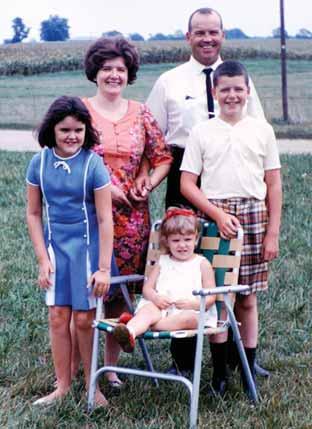
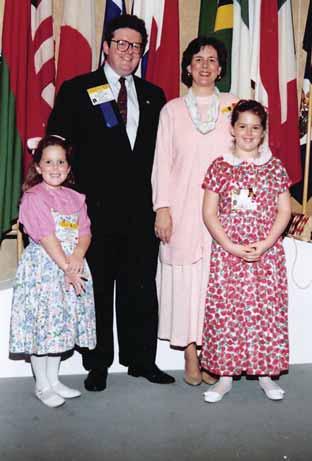
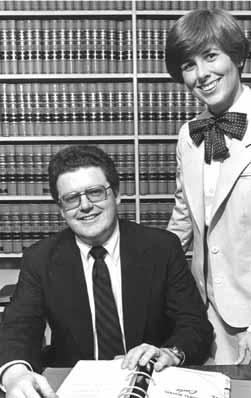
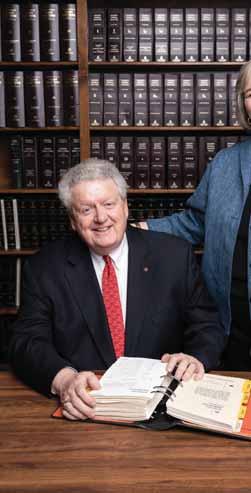

Clockwise from top left: RI President Maloney on the family farm in the mid-1960s, with his mother, Doreen, his father, Patrick, and his two sisters, Kristi (left) and Erin; Maloney and Gay in 1980, the year he joined Rotary; the Ridgway High valedictorian, 1972; Mark and Gay, still smiling, 2019; the Maloneys with their daughters, Margaret (left) and Phyllis, at the 1990 International Assembly in Dallas.
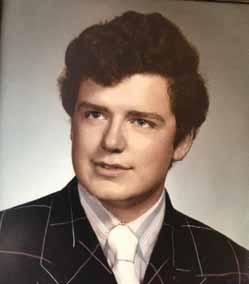

attend a party at the Harvard Club of Nashville, and Maloney travelled down to Decatur for the final days of 1977. They closed out the year at the movies watching a Disney film.
“We felt like we were a good match,” Gay recalls, “both happy to see Pete’s Dragon on New Year’s Eve.”
What Maloney calls “Gay’s first and fateful visit to my family” followed in early February. “Gallatin County had fewer than 8,000 people, and a fair number of them were related to the Maloneys,” Gay recalls. “Mark and his mother made a conscious effort not to overwhelm me, so I only met 22 of his relatives.” They drove from the Ridgway farm to the farm in Kentucky, travelled to New Harmony, Indiana, for a fancy dinner at the Red Geranium, played a card game called 500. They stopped at a drugstore to pick up some film, and Gay took pictures of Mark’s parents.
Sunday morning, the couple attended Mass in nearby Shawneetown and headed back to
Nashville. But first Maloney wanted to show Gay old St Patrick’s in Pond Settlement, the Catholic church the Maloneys helped establish in the 1850s. There was too much snow on the ground, but Maloney promised that on her next visit they would walk through the cemetery. On the way out of town, they stopped at the Maloney farm so Gay could snap a photo of the house. His parents came out on the porch and waved.
Ten days later, Maloney found Gay in the Vanderbilt library. Early that evening, he told her, his parents had been driving on the Ridgway Spur when another car collided with them head-on. Pat, 48, and Doreen, 46, were dead. Gay’s pictures were the last photos of them. The accident had occurred on the 21st birthday of Maloney’s sister Kristi, who had been away at school in New York. His younger sister, Erin, who had been in the back seat of the car, survived the wreck, though she was seriously injured.
Within weeks, he established the Pat and Doreen Maloney Memorial Scholarship Fund at Ridgway High. Around the same time, a notice appeared in the Gallatin Democrat. It expressed “deepest and
sincerest gratitude” to all those who had stood by the family after their recent loss. “Through this trying time, the love, compassion, and support shown to us by the residents of Gallatin County... has been overwhelming. Our belief in the goodness of man has been reaffirmed.”
In the aftermath of the car crash, Gay had introduced herself to the mourners who came to the family home — Paul Simon among them — as “Mark’s girlfriend.” In fact, she had quickly become far more, and by early April they were engaged. “I think we would have ended up in the same place that we were heading, but the accident sped things up a little,” says Gay today.
In their third and final year of law school, the couple wondered where they would go next. “When I went away to college, I didn’t go to Auburn or Alabama,” says Gay. “I wanted to go somewhere that was beyond my horizon. So I went to Agnes Scott in Atlanta.” Her feelings hadn’t changed. She still wanted to “see some of the world.”
But on a weekend visit to Decatur, Gay’s father, J Gilmer Blackburn, took Maloney for a
drive. “Gilmer explained the benefits of living in a small city and of being in a family law practice,” Maloney explains. A new prospect opened up for the couple: making their home in Decatur and joining Blackburn’s law firm. They debated the possibilities, though, he says, “we were not on opposite sides.”
He adds, “When we moved to Decatur, we thought we were doing Gay’s parents a favour” — a sentiment Gay, in a separate conversation, echoes in almost identical words. They leave unsaid that the favour was actually going in the other direction. “My father had a vision of what a good life we could have in Decatur,” Gay says. “And maybe at the time we didn’t fully appreciate that.”
Gilmer was a brilliant individual,” says Ken Schuppert, who, along with his wife, Lynn, is a partner/member in the law firm started by Gilmer and now known as Blackburn, Maloney and Schuppert (Like the two Maloneys, both Schupperts are Rotarians — and Ken
currently serves as vice chair of the Trustees of The Rotary Foundation). “His expertise in life insurance taxation was so superior and so unusual here. He was the first tax lawyer north of Birmingham in Alabama back in the mid1950s. But being involved in the community and paying back your civic rent: That was something we all learned from Gilmer.”
“I think Gilmer was actually a very strong father figure in Mark’s life,” says Bill Wyker, of the Decatur Rotary club. “They had a grand, very close relationship.”
Wyker also has strong memories of Gay’s mother. “Phyllis was a pistol,” he says. “She supported Gilmer, but she had her own thoughts and ideas and activities and pursuits. And she was fearless. If Phyllis wanted to take on something, then better buckle your chin strap.”
Following their marriage in June 1979, and after Maloney earned a Master of Laws degree in taxation at New York University, the family settled in Decatur. With his background in farming, he got along immediately with his new neighbours. “Mark
“Mark’s greatest strength: He just cares. He has a heart of gold — and he has Gay at his side. They’re
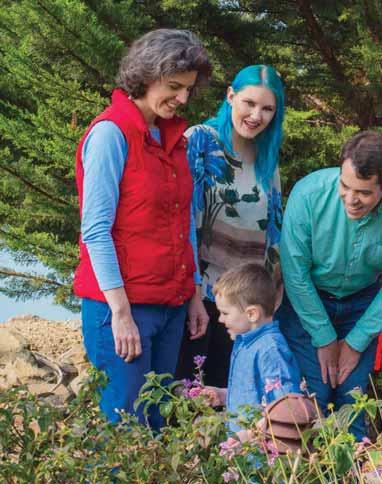

was the perfect combination of a guy who is absolutely brilliant,” Wyker says, “and yet at the same time the kind of guy you like as soon as you shake hands with him.”
“Mark is one of the most dignified, formal people I know,” adds Decatur club member Ellen Didier. “It’s a surprise to find out how warm he is and how funny. There’s a genuineness to his heart, his humility, his wit — and his self-deprecation.”
Maloney joined Rotary in 1980; five years later, when he was 30, he was president of the Decatur club. That’s when he learned that a Rotarysponsored Group Study Exchange team from Nigeria was slated to visit
Alabama — and Decatur wasn’t on its schedule. He made some calls, and the visitors from Africa ended up spending two days in Decatur. “We just went all out,” Gay remembers. “Mark and I had a party for them at our home, and we made sure they had outstanding hospitality. The team leader said, ‘I want that young man to lead the team to Nigeria next year.’ So when our daughters, Phyllis and Margaret, were four and two, Mark was gone for 40 days and 40 nights to Nigeria” — planting the seeds for his presidential theme: Rotary Connects the World
“We’d been told we were ambassadors of goodwill, and to this day

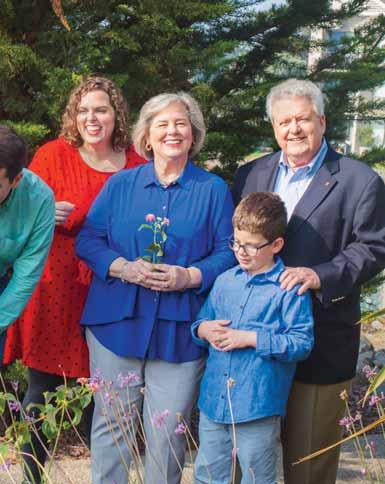
I still refer to him as Mr Ambassador,” says Mike Curl, one of the six members of the GSE team from Decatur to visit Nigeria. “He was very good with people and picking up on and understanding their culture.”
In July 1990, Maloney returned to Nigeria, and this time Gay joined him, bringing her college textbook on African art. He had previously met Jonathan Majiyagbe, who had just finished his term as Rotary’s first black African director. On this visit, he and Gay stayed with Majiyagbe and his wife, Ade, at their home in Kano. “I found Mark to be a very pleasant person,” Majiyagbe says. “He was very hardworking. I call
Another longtime friend Maloney has made through Rotary is his own presidential aide, Larry Lunsford. A member of the Rotary Club of Kansas City-Plaza, Missouri, a past governor of District 6040, and a former RI director, Lunsford has an impressive Rotary résumé. Yet he’s the first to admit that “it’s hard to find someone in Rotary who is as experienced as Mark Maloney. He’s outstanding at outlining and envisioning the process that can best realise his and Rotary’s goals, and he’s going to use his organisational and administrative skills to maximise opportunities to make Rotary even better.”
heart of gold — and he has Gay at his side. They’re a great team, and Mark benefits from that.”
As much as anyone, Gay, the would-be traveller who has likely seen more of the world than she ever expected, appreciates the irony of being able to see her high school from the front door of her house.
him a mobile computer: He remembers everything to the minutest detail.”
A close friendship formed between the couples, and when Majiyagbe was nominated as 2003–04 RI President, he and Ade chose Maloney and Gay to be their aides.
In 2003, less than a month before taking office as president, Majiyagbe was in Brisbane, Australia, when Ade died unexpectedly in Leeds, England. “I don’t know what I would have done without Mark Maloney,” Majiyagbe recalls. “He arranged for my ticket to Leeds, and he and Gay travelled there at their own expense to be by my side. We bonded together. They are my family in Decatur.”
Lunsford underscores Maloney’s “strategic focus” on increasing Rotary membership — with an emphasis on “the need for more diversity in our approach” to attracting and retaining members — as well as “the priority Mark has put on elevating our partnership with the United Nations, which creates another way to enhance Rotary’s standing in the world.” He also notes that “Mark wants an even stronger synergy between Rotary and Rotaractors. Rotaractors are feeling stronger than ever about the possibility of an enhanced relationship with Rotary. Those are winds we hope to fan.”
Lunsford switches gears to identify what he calls “Mark’s greatest strength: He just cares. He has a
“I recall thinking, when we returned to Decatur, that we were turning our backs on the opportunities to see the world,” she says. She was mistaken. In the Maloneys’ living room, framed photos on the walls, alongside Gay’s colorful paintings, document the global scope of their 39-year Rotary journey, as do the mementos crowding the shelves. Gay officially became a member of the Rotary family in 1996 when she joined the newlychartered Rotary Club of Decatur Daybreak. “Mark and I can practise law together, and we can raise our family together,” she confesses. “But there is no Rotary club in the world that is big enough for both of us.”
The Maloney daughters were as much a part of that Rotary journey as their parents. “As we evolved into a Rotary family, our girls grew up with a broad vision of the world,” Gay says. Between them, Phyllis
and Margaret have attended more than 30 conventions, and the youthful interactions they had as children with people around the world influenced the course of their lives. Spurred by a childhood interest in geography, Phyllis studied British history and literature at Harvard and the University of Cambridge before earning a law degree from Yale. As a girl, Margaret was fascinated by language and words and went on to study linguistics at Harvard; after a career in publishing in New York City, she’s completing her fourth year of medical school at Stony Brook University on Long Island.
In 2014, the Maloneys welcomed Suzanna Greer into their home as their third daughter after the death of her mother.
“Because of the tragedy Mark had encountered as a young person, he was particularly empathetic to Suzanna’s situation,” recounts Gay. “I told him I’d been thinking of asking her to move in with us, and
he said yes right away.”
Now 25 years old, Suzanna is a student at the University of South Alabama and a veteran of three Rotary conventions — while Patrick, 7, and Peter, 4, the children of Phyllis and her husband, Blake Johnson, already have two conventions under their belts.
Among the pictures in the Maloney living room are photos of him with two Popes — not surprising, perhaps, when by some accounts, the name Maloney comes from the Gaelic Maol dhomhnaigh, meaning “devotee of the church.” He spent 12 years on the finance council at Decatur’s Annunciation of the Lord Catholic Church (formerly St Ann Catholic Church) and 16 years on the St Ann Catholic School board, just two of the ways he was active in his church.
“You could always rely on Mark,” says the Rev Ray Remke, the former longtime pastor of Annunciation. “If you needed something, he would be there in any way he could. He exemplifies his faith by living it in word and deed.”
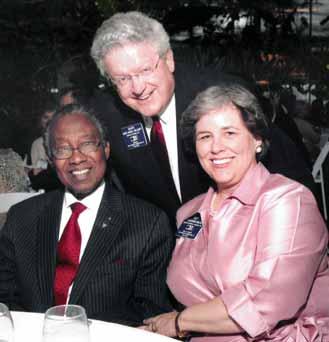
John’s Episcopal Church. “My father taught me the importance of service to your (church), your family, and your community,” says Ronnie Dukes, another Decatur club member.
“And Mark obviously does a great job at that.”
tradition started in 2002 by Phyllis when she was a student there and continued today under the auspices of the Decatur Daybreak Club.
He’s a great communicator and has a brilliant mind; he’s compassionate and cares about people.
I mean, you’ve got the whole package.
Maloney brings an ecumenical spirit to his faith: He and Gay regularly attend Sunday Mass at Annunciation and services at First United Methodist Church, where they were married and where Maloney is an usher. He also participates in a Bible study group that meets weekly at St
Indeed, when it comes to his adopted hometown, Maloney is a one-man chamber of commerce, and he proudly shows off Decatur to visitors: the Old State Bank, pocked with bullets and mortar shells from the Civil War; the Riverwild playground and splash pad in recently rejuvenated Delano Park, an oasis of green, given new life by Rotarians and other citizens; and the Habitat for Humanity development, where each year students from Harvard work during their spring break — a
Residents of Decatur are equally proud of their hometown hero. “The fact that Decatur, Alabama, should be home to the president of Rotary International,” marvels David Breland, a former Morgan County district judge who now serves as Decatur’s resident historian and director of historic resources and events. “We’re in the high cotton now.”
“Mark’s a unique guy, one of the most impressive people I know,” Wyker says. “I’m tickled to death he’s Rotary’s next president. He will make his mark.”
© The Rotarian
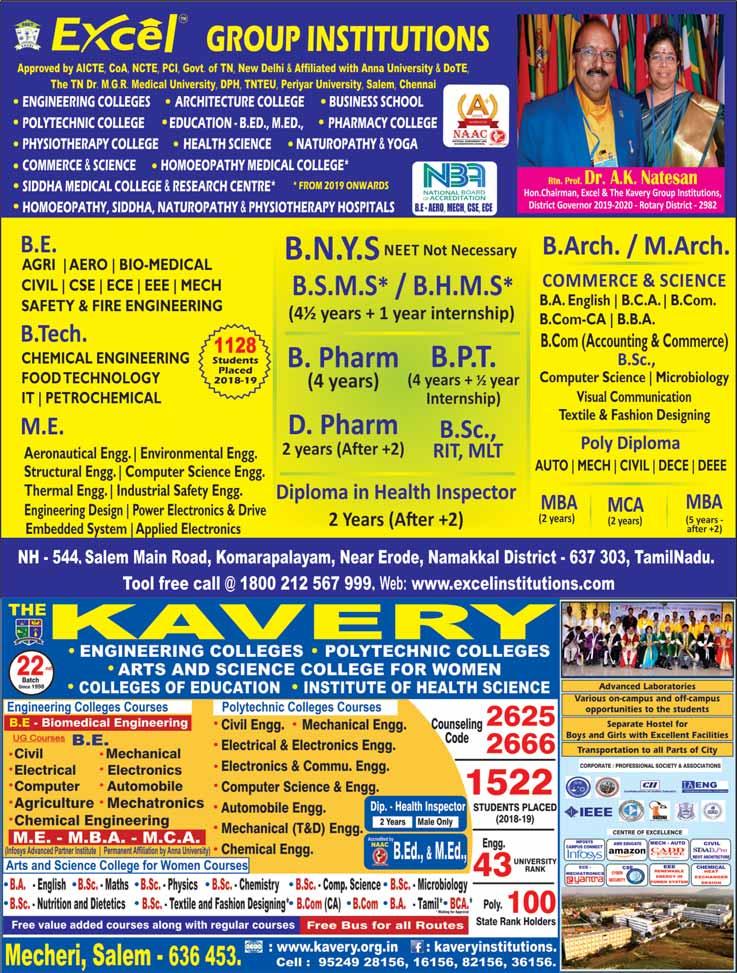
Awhole new mechanism is being worked out at The Rotary Foundation to ensure that a good proportion of the CSR funds that the Government of India mandates large profit-making companies to invest in welfare activities, comes to TRF, says TRF Trustee Gulam Vahanvaty.
In an interview to Rotary News, when asked to elaborate on the hitch in Rotary getting a good and steady flow of CSR funds from India as the senior Rotary leadership in the zone had expected last year, he said the Trustees are already working on this.
Vahanvaty explains that the Trustees decided that TRF should allow the CSR funds from India to “come to the Foundation because many companies said we want the
security and name of TRF to receive our funds. We were very happy to receive those funds. But the Trustees said this money won’t go back straight to the projects, and will come through global grants.”
But the mismatch between what the corporates wanted their funds to go into and the ‘community needs assessment’ that Rotary needed, meant the rejection of several global grant applications. “We are working on a mechanism to sort this out; but to answer your question, yes, we haven’t been as successful as we’d have liked to be to get CSR funds from India.”
Asked to define the relationship between RI and TRF, Vahanvaty says, “They are very closely connected. They are part of the

same organisation or two sides of the same coin. RI deals with issues related to clubs, administrative matters and the essential money matters. TRF is meant to do good in the world so it collects money from the donors or benefactors and then ensures the funds are given to and spent on projects that incorporate one or more of Rotary’s six areas of focus. Some of these areas are very popular compared to the others, but
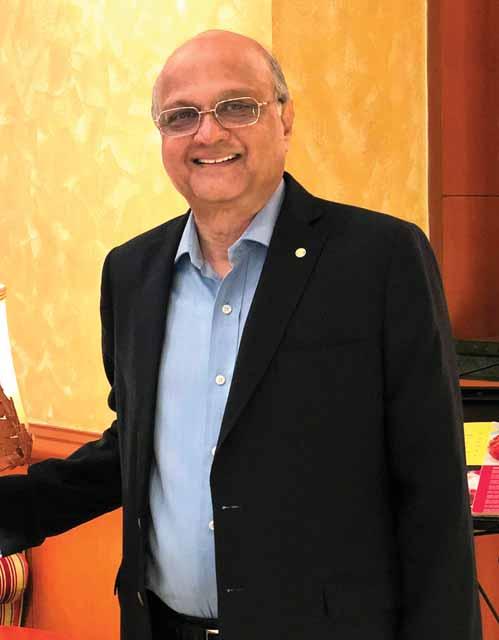
we are going ahead with all the six areas of focus. We’ve done a lot of tweaking of the actual words in the policy document which is now very clear and without any grey areas. But, answering your question, RI and TRF really must work closely together.”
Giving an example, he says, “Director Basker and I worked very closely together, we had an excellent relationship and I look forward
to working as closely with the two incoming Directors Bharat Pandya and Kamal Sanghvi.”
Inext ask him to spell out what is so special about TRF that it attracts people like Bill Gates, Rajashree Birla, and more recently, D Ravishankar, President of RC
Bangalore Orchards, to entrust it with such large chunks of their money. Vahanvaty smiles. “Just trust. Trust which has been built up over the years. Consider this: who decides that TRF is the right place to give money to? I may shout from the mountaintops that this is the best place to give your money, but then I am Rotarian and I can be biased. The donors see various reports that come from independent assessors and then take a decision.”
The most notable of these assessing agencies is Charity Navigator, which is based in the US and rates nonprofits only in the US. “It rates about 8,000 to 9,000 nonprofits every year on a large number of parameters on which they judge you and then give a rating of 1-star, which is the lowest, to 4 stars, which is the highest rating. For 11 years, we’ve got a 4-star rating, which speaks for the integrity, stewardship and the fact that we use the bulk of our money for our projects, using a very small percentage for admin and promotional expenses.”
Vahanvaty’s family comes from a small town, Bagasara, in Gujarat, which is about 100 km from Rajkot.
Imagine my delight when at the airport I was met by the first family I had stayed with. And I lived in the same room in the same house I had stayed in 22 years earlier! Such magic can happen only in Rotary!

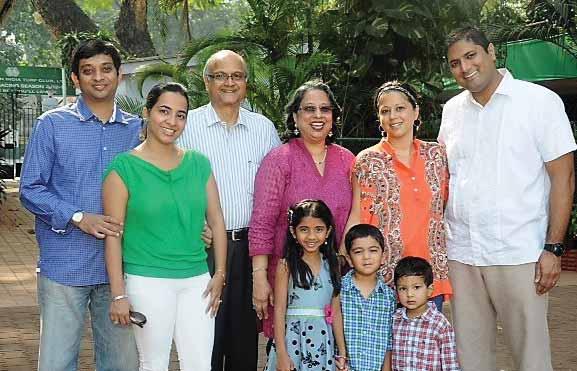

Relax: I love racing… the sheer thrill of it. I was a very good rider, having learnt horse riding at eight. I’ve ridden in Gymkhana races, won a couple of races, and did begin to play polo, but gave it up.
Fitness: I go to a gym thrice a week and workout for 60 to 75 minutes.
Reading: I love reading. One of the best books I have read is A brief history of Time by Stephen Hawking. It’s a classic book and I thoroughly enjoyed it.
Music: I love Hindi film music, songs from the 1970s and 80s. I used to be very fond of Western country music but that’s gone into the background now.
Movies: I watch some light TV programmes… some brainless serials to completely relax, something that doesn’t tax your brain and allows you to sleep!
Food: I am a foodie. I eat all kinds of food. I love Asian cuisine, my favourite is Chinese. I like Japanese food too, but my daughter, who now lives in the US, has to be with me as she tells me what is extremely raw and what is not so raw!
Rotary’s gift: First of all, friends; not only in India but across the world; a sense of purpose and a platform through which I can not only do good for others but also grow individually, which I have done after joining Rotary. Today, in my personal life, given that my wife Haseena is no more, Rotary has filled a big void. She had cancer of the gall bladder, we diagnosed it in August 2014, and on Jan 1, 2015 she was gone. But fortunately, I don’t live alone and don’t return to an empty home. I live with my son and daughter-in-law.
But he was born and grew up in Mumbai and during his childhood “my mother had the most influence on me. Both my parents were not very educated, but she was very clear that she wanted her children to be educated in the best school they could afford. So I first went to St Mary’s High School, graduated from St Xavier’s College and then went to IIM Calcutta. I had got admission into an American university but the moment I also got selected to IIM Calcutta, my father said forget about the American university, I respected Dad and stayed on in India.”
Through campus recruitment at IIM Calcutta, he was selected to join the Tata Administrative Service before his graduation in 1970. After his training, he was assigned to Tata

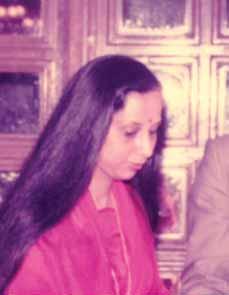
Haseena and Vahanvaty.
The rapport that Haseena created with the spouses of my presidents was something special and was emulated in subsequent years.
Oil Mills (which was later sold) where he worked in the marketing department for over four years. But in 1974, as his father was very unwell, he submitted his resignation. “And here the greatness of the Tatas comes in. They said why are you leaving? When I explained that I was the eldest son and would have to take care of the reasonable business we had in iron and steel scrap processing, they offered me lien for a year.”
But within six months his father passed away; “they came to offer their condolences and extended
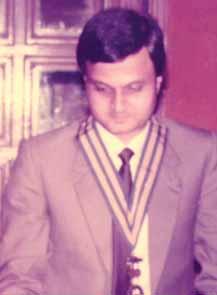
my lien by another year. I had a two-year buffer to decide if I wanted to return. But once you are in a business of your own, it is very tough to leave it. So I stayed on; we were ship breakers and iron and steel processors. Much later, we bought a ship breaking yard in Kochi, which unfortunately created a problem and had to be shut down,” says Vahanvaty. Now he is in a different business; an alliance with Raymond where he runs a showroom ‘Made to Measure’ in Mumbai and another that markets Ora jewellery and also an arts and crafts gallery, called Cache.
Coming to his Rotary journey, Vahanvaty remembers “very clearly” the Sunday morning in 1978 when he saw an ad in the Times of India inviting applications from young men — “mind you in those days it was only for men!” — between 25 and 35 years for an exchange
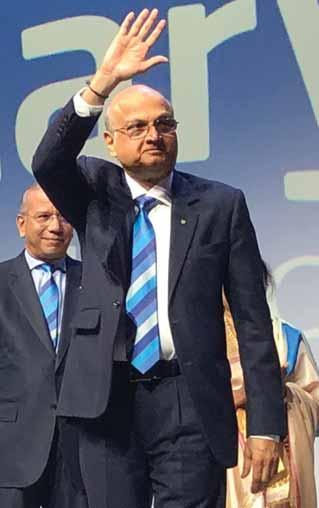
Vahanvaty being introduced as a Trustee of TRF at the Hamburg Convention.
programme in Indiana, US. “I was married by then and asked my wife Haseena if I should apply, and she said what is the worst that can happen; you won’t get selected.”
He applied and did get selected! “At that time, I knew very little of Rotary, except that there was a very rich men’s club (RC Bombay) which met in the Taj Mahal Hotel every week and had great food! That’s all I knew but when I went to the programme, it just changed my entire
outlook of Rotary; it was a life-enhancing trip!”
He adds that five persons were selected from some 100 applicants after several rounds of interviews “and I consider myself very lucky to have been selected.”
It is nothing short of awe with which the TRF Trustee recounts his Rotary Group Study Exchange programme experiences. During the six-week exchange programme, the young men stayed with 13 different
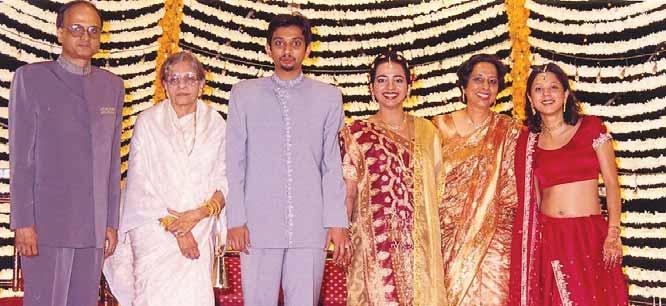
Son’s wedding. From L: Gulam Vahanvaty, mother Fatema, Zameer, Khatija, Haseena and daughter Zahabia.
families. “And I really mean it when I use the words ‘life-enhancing’. This programme was so beautifully structured that some of the families have stayed in touch with me till now.”
He went on this programme in 1978, and next year, in November 1979, he joined RC Bombay Midtown. In 2000, when he was nominated DGN, a Rotarian in the US who was taking over as DG, invited him as a speaker for his district conference, saying that all he would have to do is pay for his ticket and the organisers would take care of the rest.
“I went and imagine my delight when at the airport I was met by the first family I had stayed with in the US. And during that trip, I lived in the same room in the
same house I had stayed in 22 years earlier! Such magic can happen only in Rotary!”
To the question if his rise to the governor’s position was difficult, he shrugs and says: “I don’t know; that’s a tough question. It took me many years to become a DG. I was club president in 1985–86 and then I was selected the alternate team leader for GSE twice, but never made it as the team leader! But I am happy that eventually I was selected DG; it was a unanimous decision, and I became governor in 2002–03, and we had a
phenomenal collection in TRF, the highest-ever in any district and that record remained until 2006–07, when incoming Director Bharat Pandya surpassed that figure as DG. Pandya was one of my assistant governors, as also Raju Subramanian.”
Next, in 2004, he became an RRFC



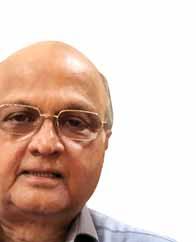

We should be net givers and not net receivers. Last year we gave $19 million and got back $18 million. I hope this year we give much more.

(Regional Rotary Foundation Coordinator);
“I had only one fallow year. Rotary has been very kind to me.”
He had also put his hat in the ring for the RI director’s post. How disappointing was it not to make it to the director’s post? “Very disappointing; there are no other words to say that. I was chosen as the alternate… what can I say?”
But then very soon he was chosen as a TRF Trustee… a bit of a dark horse, I dare to suggest!
Vahanvaty smiles in response, and with the word ‘horse’ triggering memories, says: “Let me digress here. I am very fond of horse racing. My family has been involved in horse racing for long years, and I started riding a horse

Haseenaand I met in 1962, when we were 14 years old, on a tour to Kashmir. We got engaged in 1969 and married in 1970.

As the spouse of a Rotarian, she was more than involved and became Charter President of Inner Wheel Club of Mumbai Downtown. This was in 1985–86, the same year when I became President of RC Mumbai Downtown. She was involved in every bit of my Rotary career, especially

from the age of eight, and continued riding till I joined the Tatas.
I became a steward of the Royal Western India Turf Club (RWITC) about 10 years ago. The
when I was DG. The rapport that she created with the spouses of my presidents was something special and was emulated in subsequent years. She helped me with my speeches; made sure I was properly and appropriately dressed and was my biggest critic. I valued her constructive criticism as it helped me improve. She made friends all across the world and Rotarians in India, Australia and in the US still miss her.
stewards are those who control and regulate racing; their objective is to ensure fair racing. After that I was elected to the committee, and became chairman of

the stewards, which is a three-year term.”
An important election at the RWITC took place on Sept 11, 2017, “and the selection of the RI director nominating committee
took place on Nov 18. I lost and was disappointed and thought would continue as chair of the stewards committee. On Sep 24, I got a call from RIPE Barry Rassin appointing me as Trustee and the Board voted on that three days later on Sep 27. “I don’t know how it happened, but I am very grateful and privileged to get this position. Very rarely does a person who has not served as an RI director becomes a Trustee. There are only two in our region, though several in other parts of the world — PRIP K R Ravindran and O P Vaish; both became directors only after they had served as Trustees. The Vice Chairman of TRF (TRF Chair till June 30,
There are only two in our region, though several in other parts of the world – PRIP K R Ravindran and O P Vaish - both became directors only after they served as Trustees.
2019) Brenda Cressey is not a director.”
Inext ask Vahanvaty on India’s stellar performance in TRF giving, bolstered last year by the stunning donation of Rs 100 crore ($14.7 million) by RC Bangalore Orchards President D Ravishankar. But he did have many apprehensions and confusions, as spelt out in an interview to Rotary News And to address them Vahanvaty had gone down to Bengaluru. How did that meeting go?
He smiles and says, “Very well, we hit it off; there was mutual respect and understanding and a lot of give and take. He had many doubts and I am grateful to the Foundation because we made a lot of allowances for him.”
In what way?
“Well, the endowment… because it was such a large sum, normally the Trustees would have said let’s stick to the straight and
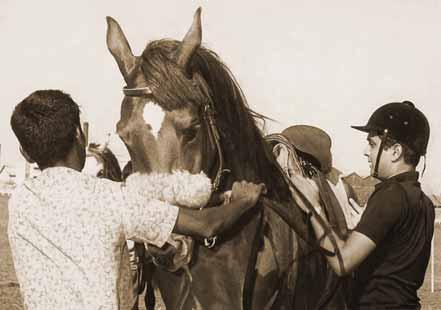

My parents: My father died at a very early age and yet instilled in me values of integrity and humility that I cherish. My mother, of course, was very special and thanks to her prayers and constant good wishes, which only a mother can give, I am whatever I am today. She was very close to me and though not well-educated, was very sure that her children should get the best possible education. In those days, for a Muslim woman, who was not well-educated, to insist that her children get the best of education, was nothing short of wonderful.
Kalyan Banerjee: What I admire the most about him is that he listens. I wish I had that ability to listen, absorb and then speak. He speaks very little, but when he speaks, it is of substance.

narrow, but to meet his needs we made a lot of adjustments and the Trustees were very proactive in taking this decision.”
On stewardship issues found in India while executing global grants, Vahanvaty says: “There are 150,000 Rotarians in our zones.
The number of people who have not followed the principles of TRF are minuscule… it’s an absurd percentage. And yet, these very few people constitute what is like putting one drop of ink in a very large bottle of water; the entire water will get coloured. What is embarrassing is that for some months, when I was a backbencher and PRID Sushil Gupta was the Trustee, every time the agenda had some India issues

and they were all related to stewardship.
That’s why I keep stressing that don’t let these handful of people in our entire zone mess up our image. The message is now getting across and people are getting more and more conscious that
we have to follow the highest standards in stewardship in executing TRF grants.”
Vahanvaty gives statistics to show how India gets the highest amount and largest number of global grants.
“In 2017–18, of the total
global grants money given all over the world, $18 million came to India through the largest number of grants. The second country was Thailand at $4 million! So there is a greater need for us to be extra conscious because we are getting so much of
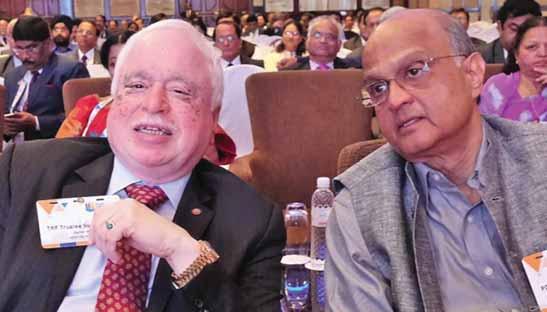
With PRID Sushil Gupta.
TRF money. I am happy that message is getting across.”
Another factor is that the biggest amount comes from the US; last year it was $138 million, “and they are not even among the 10 top countries receiving Foundation money. The greatness of the Foundation is that people give irrespective of whether they are going to get it back or not. And the objective of all the senior leaders in India is that we should be net givers and not net receivers. Last year we gave $19 million and got back $18 million. I hope this year we give much more.”
Pictures by Rasheeda Bhagat and Courtesy: Gulam Vahanvaty
Designed by Krishnapratheesh

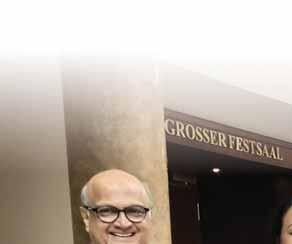
From L: TRF Trustee
Gulam Vahanvaty, Vanathy, PRIP K R Ravindran and RID C Basker.
Rasheeda Bhagat
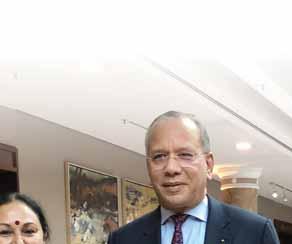
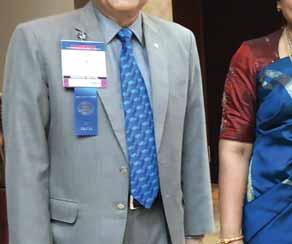
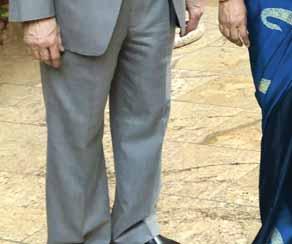


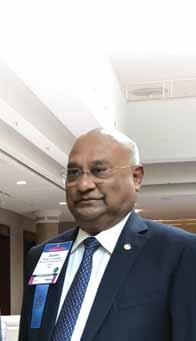


Describing the service rendered by Rotarians in South Asia and the region’s performance in membership growth and TRF giving “exceptional”, RI President Barry Rassin said at the South Asia Reception at the Hamburg Convention: “You are an exemplary region in the Rotary world.”
He was addressing a hall packed with senior icons from both RI as well India, including Esther, RIPE Mark and Gay Maloney, Trustee Chair Brenda Cressey, RIPN Holger Knaack and Susanne, PRIPs Rajendra and Usha Saboo, Kalyan Banerjee, Gary Huang and Corinna, John and Judy Germ, K R Ravindran and Vanathy, RI General Secretary John Hewko, RI Director C Basker, incoming Directors Bharat Pandya and Kamal Sanghvi, TRF Trustee Gulam Vahanvaty, several serving and past RI Directors and Trustees and their partners. The RI President said he was coming from the Rotaract Preconvention and found that “our Rotaractors are energised, moving and making the changes we will be talking about this week. From July 1,
there have been 1,064 new Rotaract clubs and 577 of those clubs are in your area! I am so proud of the work that you are doing.”
Adding “we can’t thank you enough for what you’re doing”, he said not only does South Asia have “the fastest growing membership in the Rotary world, I also believe that this region can be No 1 in giving to our Foundation. You can do it... you have the generosity, you have the spirit, you have an ability to do things that inspire the rest of the world.”
He added a “special thank you” to Saboo and Usha for “the amazing work they continue to do. He was and will always be my President; and since 1991–92, when he was the RI President, he continues to work with the same energy and spirit to help people around the world.”
Rassin said he had the “privilege” to go with Saboo, some 19 surgeons and 15 volunteers from India on a VTT Medical Mission to Madagascar to work in two hospitals “where they performed 3,500 surgical procedures in eight days. That itself is a feat. But they did it without the normal supplies that a first-world
hospital has and transformed that community. We need to give more credit to our VTTs across the world because they are transformational. They are changing lives. You should go with President Raja and watch him in the operating room. The surgeons think he is a surgeon and I was kind of scared that he was going to pick up a scalpel!”
On the direction that Rotary will now have to take, Rassin said now that Rotaract has become a member of RI in the Rotary constitution and by-laws, “a great honour to give our young professionals” Rotarians would have to give them value through both guidance and mentoring so that they enter Rotary clubs after ending their Rotaract journey. “I challenge Rotary clubs across the world to be a flamingo of change, because we need to think differently to remain relevant in today’s world. If we can do that we can accomplish so much more.”
Even though Rotary was the No 1 humanitarian organisation in the world, Rassin urged the need to make it stronger, keep it growing and ensure that the communities get to know about the work it was doing, so that it could
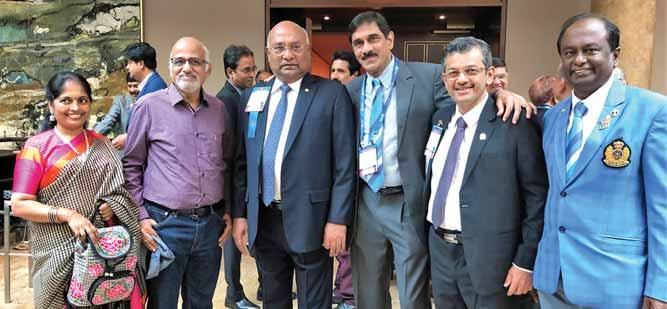
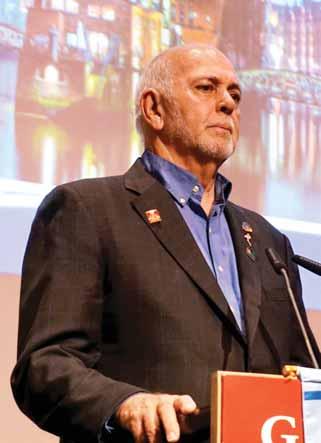
attract partners. And, finally, Rotarians could not afford to take their eye off the goal to eradicate polio from the world. Complimenting PDG Aziz Memon from Pakistan, who was at the reception, Rassin said Rotarians in Pakistan were dealing with the challenges of continuing to work to eradicate polio from Pakistan and Afghanistan and needed all support from both the region as well as the rest of the Rotary world. “To end polio is the promise we’ve made to the children of the world and we have to and will fulfil it,” while continuing to work on all the focus areas of Rotary including health, education, water and sanitation, and improving livelihoods.
Describing Rotary in South Asia as “phenomenal” RIPE Mark Maloney said that over the last 10
years, membership in India had grown by 56 per cent; India was now the second largest contributing country to TRF, and “I would put the level of service of Indian Rotary clubs among the best anywhere in the world as an outstanding example of Rotary service. In the past several years, Rotarians and Rotary clubs in South Asia have been an inspiration and together we will all work to connect the world in 2019–20.”
PRIP Saboo recalled that when the South Asia reception was first started, there were hardly 50–60 participants, and about 75 per cent would be invitees, and very few from South Asia. It began as a breakfast
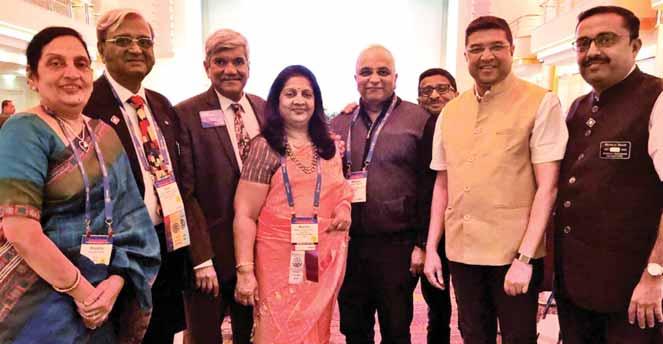
Through the Hamburg session
Sushil Gupta, who opted to step down from his position as RIPN recently due to health reasons, was missed. Both at a plenary session and at the South Asia reception RIPN Holger Knaack said that his joy at being nominated the RI President had been clouded by the fact that this had been made possible by Gupta opting out due to ill-health and wished him a speedy recovery.
At the South Asia Reception, PRIP Kalyan Banerjee said that while it was always wonderful to be a part of this
meet “which is the culture here. But we realised that South Asians are not “mad” to get up so early, and hence it was later made an evening event. As you can see this big hall is full today.”
He complimented Basker for his “great leadership” and said that along with Trustee Gulam Vahanvaty, had succeeded in addressing “some of our weaknesses”, even though we are the fastest growing region. Referring to the previous evening’s fireworks, Saboo said those were to celebrate Knaack’s nomination as the first ever RI President from Germany. Congratulating him, he added: “While coming here,
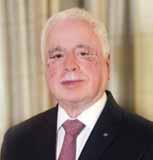
special event, the one person he sorely missed that evening was “my old friend Sushil Gupta. By god’s grace, let me say, that Sushil is doing his best to recover. He has had a difficult time but
I spoke to Sushil (Gupta) and he said I am very happy that Holger is going to be the RI President in 2020–21.”
Addressing the gathering, Banerjee said he was amazed to find that evening “senior representatives from almost the entire Rotary world.” He had missed coming to the last convention as his wife Binota had not been keeping well. “But this time, when she saw me getting a little impatient as the convention date approached, she said,
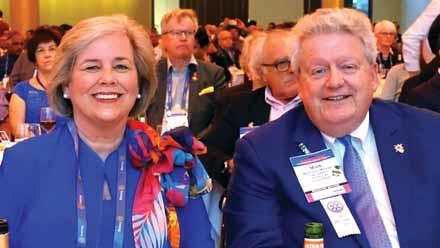
we all hope and pray that he recovers in as short a time as possible.”
South Asia is growing in membership and in TRF has merged as the second highest contributor and in service we don’t take the second place to any other country. “The service projects being done by our clubs in all the South Asian countries is unbelievable and unmatchable.
And with the incoming leadership of Bharat Pandya, Kamal Sanghvi and also Trustee Gulam, I am sure we are in for a great period ahead,” said Banerjee.
‘Kalyan, just go. Please go to the convention. I don’t want you here anymore!” And, he added, “as one who always listens to his wife, I said, ‘Ok, I am going’ and here I am!”
He congratulated Director Basker for his “amazing leadership in steering India and the region in a very constructive, creative and dynamic manner. Raja (Saboo) if you have noticed carefully, seems to be getting younger by the day, and I would love to learn how he does it. Ravi (K R Ravindran), the other stalwart from our part of the world, never really walks, he runs; and he keeps all of us running as well. We’ve had tremendous leadership in Rotary in our part of the world.”
Banerjee complimented Rotarians from India, Nepal, Sri Lanka, Pakistan, Bangladesh for “the tremendous changes you are making in Rotary in South Asia. That a small country like Nepal has become one of the highest contributors to TRF in our region is awesome.”
RIPN Knaack said he and his wife Susanne were still digesting his nomination as RI President for 2020–21, even as they worked for the success of the convention at Hamburg. “First of all I’d like to remember my good friend Sushil
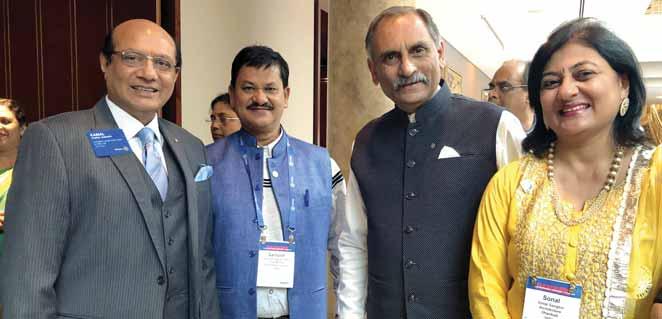
Saying he was going to take a little “presidential privilege” that evening RIPE Maloney introduced a “special guest” — his grandson Patrick, “who was visiting our room and we asked him if he would like to come here and he said ‘yes’. As you know I am very keen to make Rotary family-friendly and I thought it was better to start at home!”
He said in the last few months he had the “opportunity and regret that it will not continue, to work with Sushil Gupta. We had developed a relationship and were working together and we wish him the best for a speedy recovery.”
He had also benefitted from working with Director
Basker on the RI Board for a year and from the “reserve of wisdom you have in Rotary in South Asia with PRIPs Saboo, Banerjee and Ravindran; over the years they have provided me with guidance and advice and I thank them. I am looking forward to working with the two directors-elect Pandya and Sanghvi and also my very good friend Gulam (Vahanvaty) who is making an impact in TRF.”
Giving an indication of his “regard for the importance of India in the Rotary world”, Maloney said that during the two years as incoming and serving RI President, he would visit India four times.
“There is only one other place I will go to more than four times and that is Evanston!”
and hope that he finds the strength to fight his disease.” He looked forward to working with Maloney next year and with both Pandya and Sanghvi during his presidential year.
Director Basker complimented the Rotarians from the region for their “dedication” and quoting an anecdote of how innovative thinking can grow any enterprise/project he urged them to continue to think of “new innovations and how to create opportunities. If we shift from a denial to a thinking mode, we can always create and add more value to Rotary, provided we work as a team, are enthusiastic and have passion and eagerness.”
He urged the Rotarians from South Asia not to miss the opportunity that a Rotary convention provides to meet people from across the world, discuss opportunities to do service projects and strike partnerships.
Chairman of the reception E K Sagadevan welcomed the gathering and RIDE Pandya thanked all the senior leaders and participants for making the event a big success.
Pictures by Rasheeda Bhagat
Designed by N Krishnamurthy

Rtn Prof Dr A Zameer Pasha
M.S., FRCS (Eng)., FACS (USA)., FICS., FAIS., FRCS., FACS., FIAMS., Dip. MAS., FIAGES., FALS.,
District Governor 2019–20, RID 3000
President – IAGES - Indian Association of GE Surgeons (2017–18)
President – International College of Surgeons, India (2015–17)
Founder Chairman, Hospital Board of India – IMA, New Delhi
All India Chairman, IMA – AMS, New Delhi (2010–11)
Dr (Mrs) Shakila Zameer, MBBS., D.G.O., FIAMS.,
Dr Z Shakir Tabrez, M.S., M.Ch (Urology), Dip.M.I.S., (Urology)., FICS., FIAGES.,
Dr Z Rubina Shanawaz, M.S., (Obs. & Gyn.) FICS.,
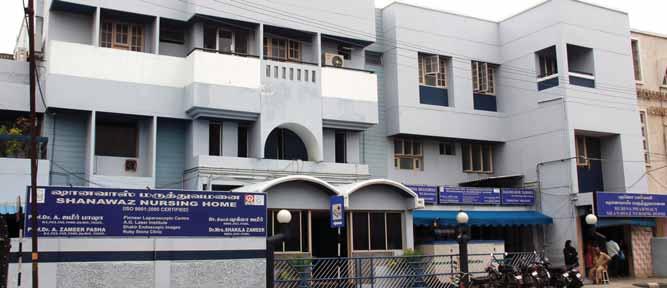

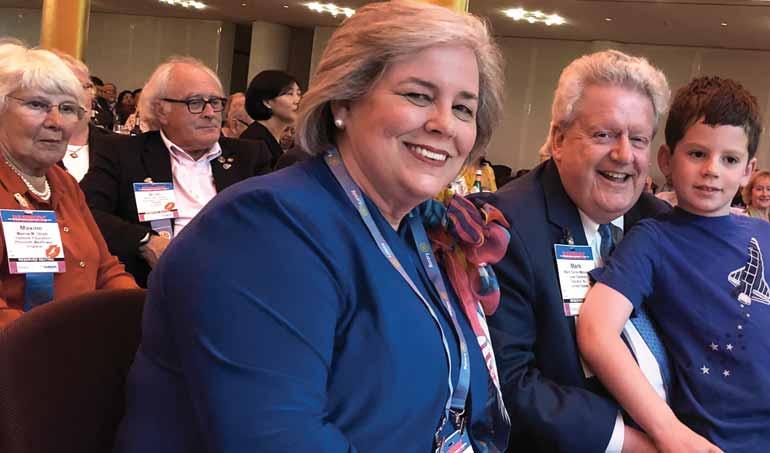
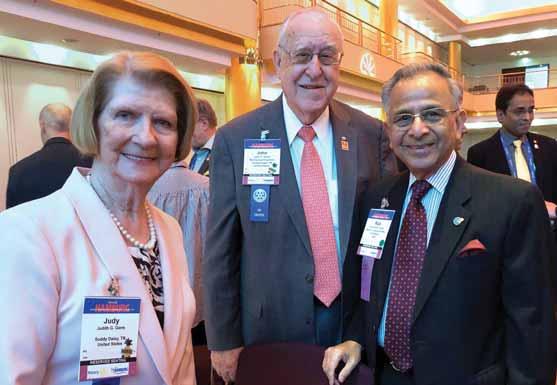

RIDE Bharat Pandya and Madhavi.
PRIP K R Ravindran and PDG Ganesh Bhat are also present.


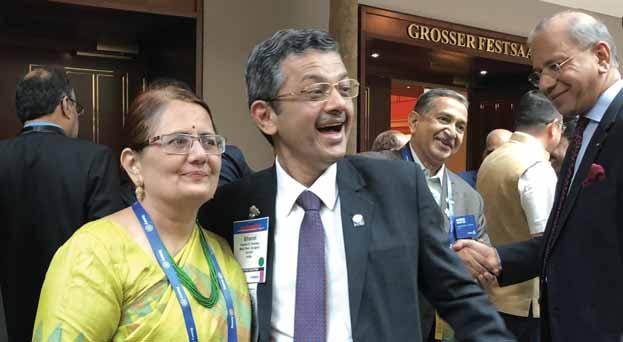



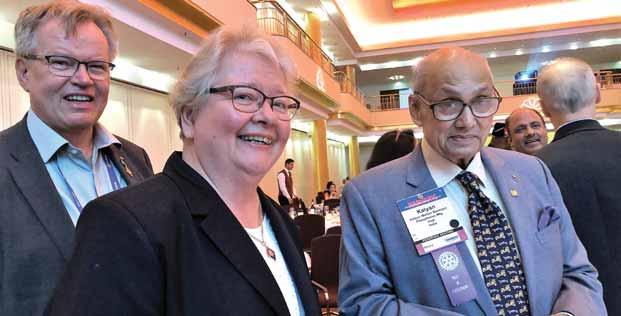
PRIP Kalyan Banerjee with senior RI leaders.
From L: PDG Raju Subramanian, Sharmishtha, PRID Manoj Desai and DG (D 3030) Rajiv Sharma.

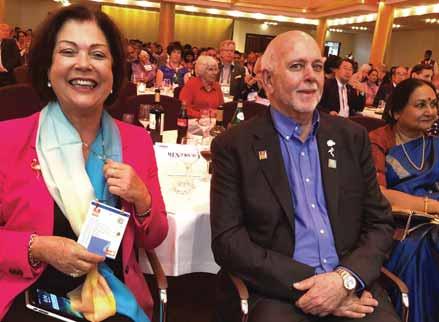

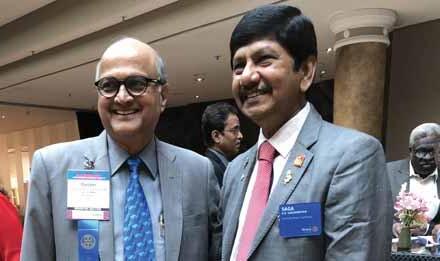
TRF Trustee Gulam Vahanvaty and SA Reception Chair E K Sagadevan.

Below: PRID Shekhar Mehta in conversation with PDG Raju Subramanian as Rashi Mehta looks on.
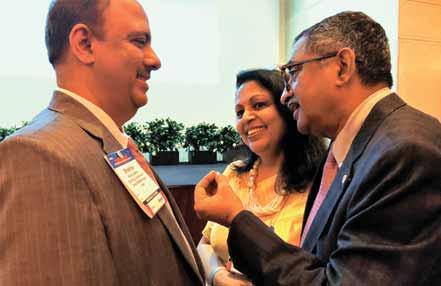
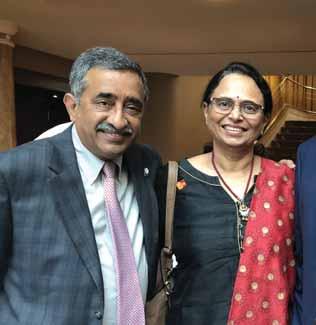
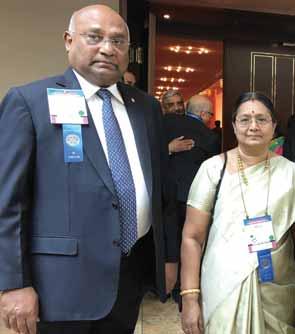
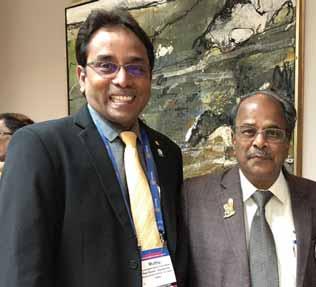

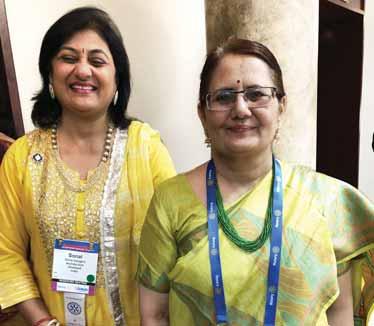




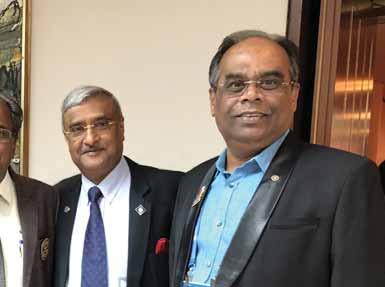
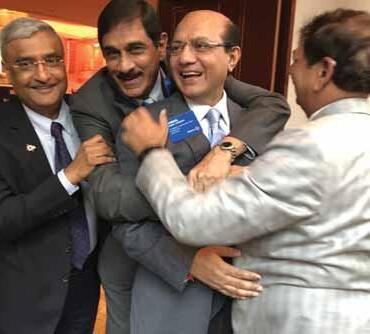





RI President Barry Rassin

One of Rotary’s core values is diversity; “we must reflect every part of humanity. Diversity ensures that Rotary represents all voices and speaks in every language. That includes age, sexual orientation, gender, race, ethnicity and abilities.”

As RI President Barry Rassin, who was addressing the opening session of the Hamburg Convention, went on to the gender part of Rotary’s diversity mantra, there was a thunderous applause, particularly from the women in the mammoth, packed hall at the Hamburg Messe, the venue. The delegates continued to clap and cheer as he said that it was imperative that “more women join Rotary and attain positions of leadership. That is why, this year, the Rotary Board has set a goal to increase the number of women in Rotary and in leadership positions to 30 per cent by June 2023. We are committed to taking action to reach these goals, and I hope we can attain them sooner.”
And to prove that this was no pipedream, Rassin went on to say that during the 2020–21 Rotary year, six women will serve on the RI Board for the first time ever. “That represents 31 per cent of the Board. And right now, we also have our first chairwoman



of The Rotary Foundation (Brenda Cressey).”
The convention saw participation of nearly 27,000 people from about 170 countries.
Another core value of Rotary was leadership, and this was more than attaining positions of responsibility. As leaders in humanitarian service, Rotarians should share their experiences through mentoring. “This past year, I have been inspired by the incredible leadership displayed by Rotaractors around the world.”
As he called out to Rotaractors in their designated area — the Inspiration Lounge — and one senior leader after another continued to call out to Rotaractors on subsequent days, a

participant sitting behind me exclaimed: ‘This truly seems to be a Rotaractors’ Convention!’”
As the youngsters responded with clapping and cheers, Rassin added: “Hamburg, if you didn’t know, is the true birthplace of The Beatles, a band that changed the face of popular music while they were all in their 20s. Rotaractors are Rotary’s rock stars. They inspire us with big dreams and even bigger actions. I call on all of the greying Rotary leaders, who have given so much to this organisation through the years, to take heed of what Rotaractors say and do. They are Rotary’s future.”

Wondering aloud how many Rotarians were attending a convention for the first time, Rassin said: “I will never forget my first convention. The Rotary convention was taking place in Las Vegas, so I thought why not have fun in Las Vegas? What I experienced instead was life-changing. What I knew about Rotary before that convention was all about my club and district and the great work we did. But it did not prepare me for the stories of incredible service Rotary does every day around the world, and the impact we have on billions of lives.”
He added that the Las Vegas convention was the beginning of his “dedication” to Rotary and had brought him to the topmost position of the organisation. While the messages he heard there were powerful, “it was the people

I met… and the stories we shared… that really stuck with me. As Paul Harris once said, ‘whatever Rotary may mean to us, to the world it will be known by the results it achieves.’ ”
No magic formula
But there was no ‘magic’ behind those results; they came from “our continued commitment and values.” The next four days’ programme, he added, would be filled with “inspiring stories that underscore the Rotary ethos
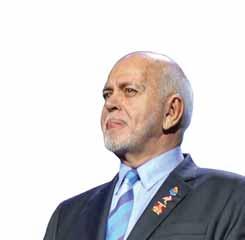


of diversity, leadership, fellowship, integrity and service.”
These, said the RI President, were more than mere words for Rotarians, being the guiding principles “that define our culture and action.”
Teamwork was another important part of Rotary; “by working together, we open up unlimited potential. It’s our fellowship that transcends all boundaries and makes Rotary a force for peace worldwide.” But if Rotary wanted to be a leader, then it had to embrace another core value — that of integrity, because only that would inspire trust and confidence in the communities that Rotarians work in. “Integrity is about not tolerating bad behaviour. We expect responsibility from our officers and friends; we apply high ethical standards, professionally and privately. In dealing with others, we are fair and respectful, and we use the resources entrusted to us consciously and responsibly.” Only if they acted with honesty and integrity, Rotarians would build trust and be successful in one of their most important missions, which was service to the community.




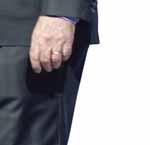
Keep focussed on polio
Finally, the RI President reminded the delegates that having succeeded in bringing the world “to the brink of polio eradication, now, along with our global polio partners, we’re launching a new strategy to take it over the finish line and deliver a polio-free world.” Despite impressive progress on this
front, the last steps to eradication had proved to be the most difficult and sessions at the convention would give Rotarians a better idea of polio eradication efforts and the final-step strategies to reach children in conflict areas. He was confident that these strategies would succeed but only with adequate resources and efficient implementation. “Your service has brought us this far — and we’ll need you now more than ever to bring this great Rotary mission to a happy conclusion for all the world’s children. We’re in the final mile of the marathon. The last mile is always the most challenging, but the finish line is in sight. This is no time to stop. We can, and must, fulfill our promise to the children of the world,” he concluded.
Pictures by Rasheeda Bhagat Designed by Krishnapratheesh S


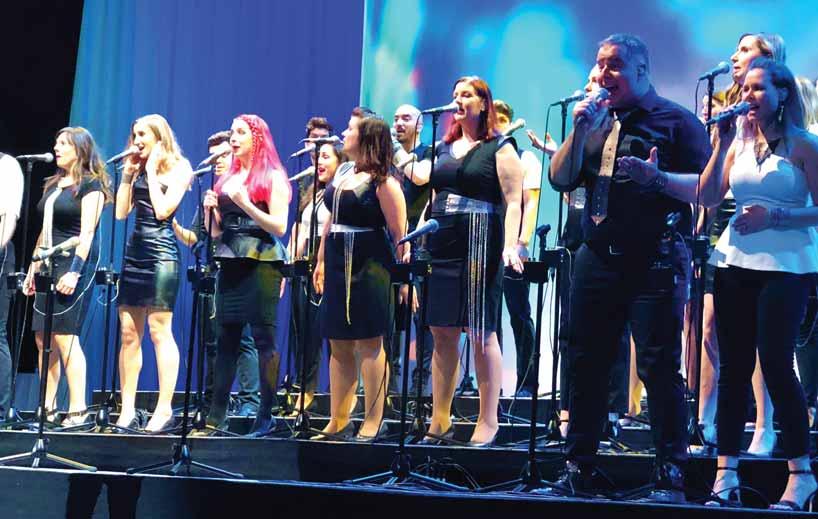
Each RI convention has its special moments and is unique in its own way. For me the defining and most memorable moment of the Hamburg convention will be the closing session when a band performing Abba’s most memorable songs including Dancing Queen and Mama Mia had the entire
audience clapping, swaying and dancing to those evergreen numbers. One person who could not confine himself to just tapping his feet from his front row seat was incoming RI President Mark Maloney. He was the first to dance his way to the colourful flags kept near the bottom of the huge central podium and did quite a few moves, jiving to the peppy music.
At the gigantic Hamburg Messe, you could spot every conceivable nationality and hear a plethora of foreign languages and dialects. As you made the long journey to the plenary sessions in the main hall or walked from one breakout session to another or to the House of Friendship, it was a good pastime to fathom what language was being spoken.


The overt and covert message of this convention was the power and energy of the youth, particularly Rotaractors. Most of the youngsters were seated in the Inspiration Lounge, set up in a separate hall, which offered various options to watch both the plenary sessions and the breakouts in comfort while having light refreshments... Just what today’s youth want.
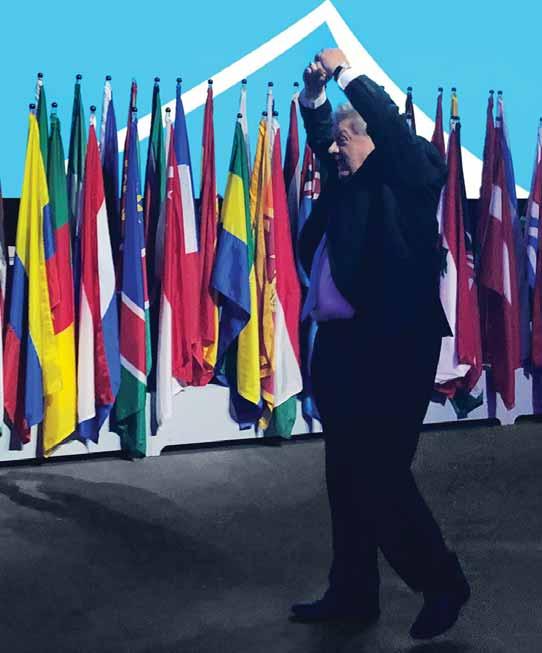
Amidst all the bonhomie, Indian Rotarians had to stomach the disappointment of not seeing PRID Sushil Gupta on the big stage along with President Rassin and RIPE Maloney.
As most of the senior leaders including RI President Barry Rassin frequently called out to the youngsters/Rotaractors seated in the Inspiration Lounge, a delegate seated behind me commented wryly: “It seems like this is more a Rotaract than a Rotary Convention!”
President Rassin had ensured that the opening session amply demonstrated the energy,
enthusiasm, innovation and talent of the young. A young artist from the Bahamas, Jamaal Rolle, had the audience spellbound as he unveiled a blank canvass and started making firm strokes on it to create a live painting that dramatically demonstrated a child getting oral polio drops. That painting was later auctioned.
After a soulful performance from a Korean singer, who came from a very humble background but has now shot into fame, we had another entertainer Julien Believe sending the audience into raptures of delight as he urged everyone to join him in dancing. Among those to oblige were President Rassin and Esther.
leaders
Rotary’s partnership with Toastmaster International was toasted by none less than its international President Lark Doley. Toastmasters will help Rotary leaders with its core competence of training people in public speaking and leadership skills.
Dr Pia Skarabis-Querfeld, a medical doctor and Rotarian from Berlin, had the audience spellbound through her account of how she got involved with the Syrian refugees pouring into Berlin four years ago, initially wanting to just drop off a bagful of clothes for them. But when she saw their terrible plight, particularly the very ill children unable to get over-the- counter medicines such as urgently required painkillers, she started a volunteering service which eventually helped thousands of refugees at community centres, tent camps, and other shelters across the city.
Today through her voluntary organisation Medizin Hilft (Medicine Helps), she involves
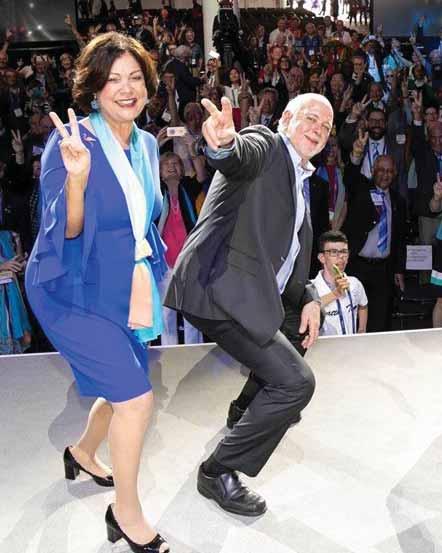
nearly 100 volunteers to give free treatment to those who have no other option.
Youth leadership Rotaractors were clearly the flavour of this convention and addressing one of the plenary sessions was the dynamic Christopher Wells, founding past president of the Rotaract Club of Market Harborough, England, who got the
crowd pumped up and laughing as he glided, darted and jumped from one end of the giant stage to the other in the flash of an eye as he talked about his Rotaract journey. He had the audience erupt in laughter when he said that after some hard thinking, he had decided that what Rotary does is “dogoodery”, and had motivated the members of his club to do just that!

Sushil Gupta remembered But amidst all the music, dance and bonhomie that rocked the Hamburg Convention, a dark shadow was cast over it, particularly for Indian Rotarians who had to stomach the disappointment of not seeing PRID Sushil Gupta on the big stage along with President Barry Rassin and RIPE Mark Maloney. He stepped down a couple of
PRIPs K R Ravindran and Bill Boyd.
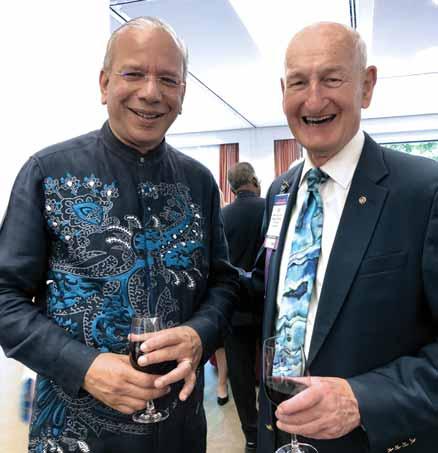
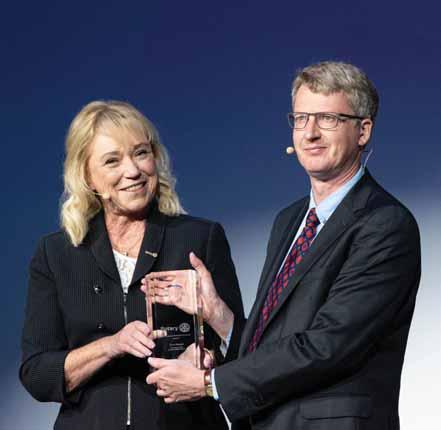
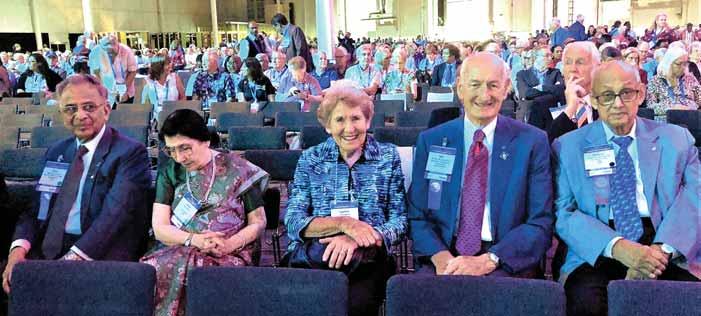
months ago as the RIPN citing ill-health. But his replacement, Holger Knaack from Germany, was a picture of grace as both at the plenary and the South Asia Reception he described how his joy at being appointed the first RIPN from Germany had been clouded by his “good friend Sushil” having to battle with ill-health. Hundreds of Indian Rotarians and Gupta’s close friends in the international Rotary community swallowed hard when Knaack beamed Gupta’s picture on the giant screen in the central convention hall.
One of the most popular places at the Hamburg Messe was the House of Friendship which always provides a great opportunity for Rotarians to showcase the service they are rendering in their communities, connect with fellow Rotarians from different parts of the world and forge not only new friendship but also meaningful partnerships.
Rotary Club of Madras had its presence as always, as also PRID
Clockwise:
Delegates promoting the End Plastic Soup, an initiative to fight against plastic waste.
From L: RIDE Kamal Sanghvi, RI Vice President John C Matthews and Mary Ellen Matthews.
Delegates at the RI Convention.
From L: RIDE Bharat Pandya, Madhavi, Sonal and RIDE Kamal Sanghvi.

Shekhar Mehta’s TEACH project. Both this stall and a breakout session stressed the importance of literacy in South Asia and explained what Rotarians were doing across the region for children’s education, teachers’ training and adult literacy, while transforming schools into happy places of learning.
An interesting stall that caught the eye wore the title ‘End Plastic Soup” and the Rotarian from Amsterdam, Wytzia de Lohman, made a powerful statement as
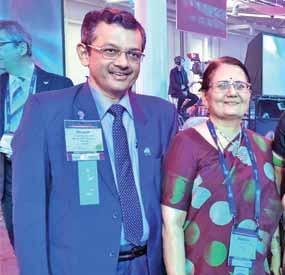
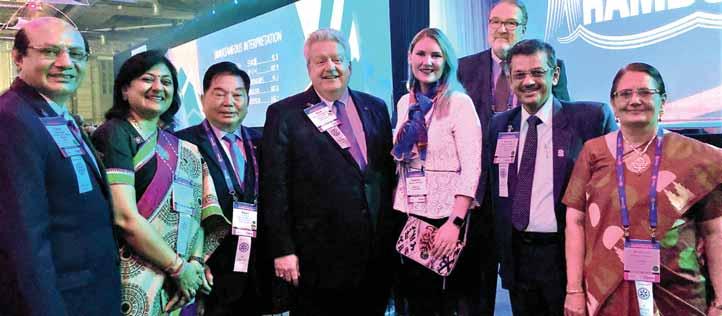
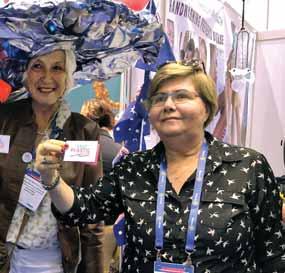
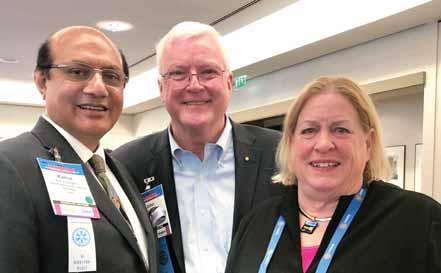
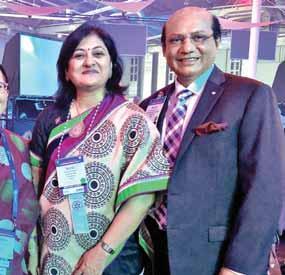
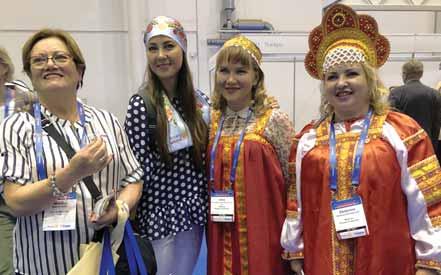
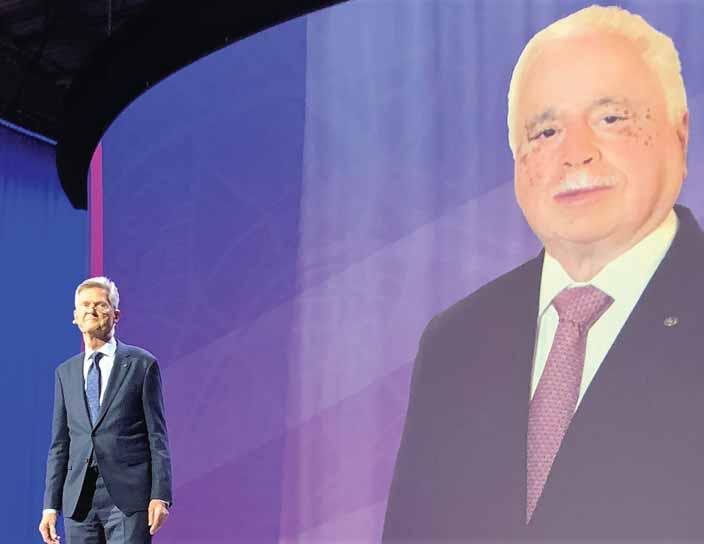
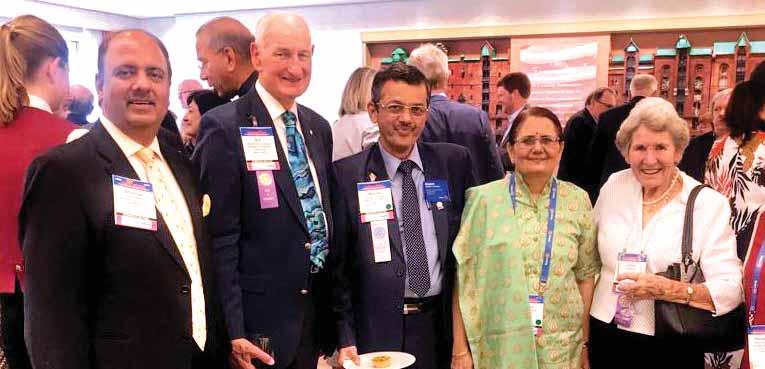

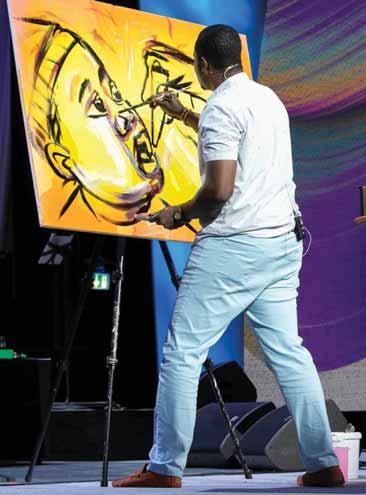
she urged Rotarians to pay more attention to environmental damage being done to Mother Earth by donning a huge hat that was made up of polythene garbage and other bags, plastic farm tools, toys, bottles etc.
As Rotarians wearing their convention badges — which brought with them many goodies such as a free ride on Hamburg’s public network, as well as one on a hop-on, hop-off bus, a good way to see any city if you are too tired or strapped for time to take a walking
tour, free entry to some museums — converged on the massive and spectacular Hamburg harbour, one image captivated them. The tagline of this convention was ‘capture the moment’, and there were clicks galore when the boat with colourful yellow and red sails carrying the End Polio message carried some participants to Hamburg, and remained docked at the central port in Hamburg for a few days.



For every new member the pro-rata is `35 a month.
Please attach the TYPED list of individual members with their complete address, PIN code, Mobile number and e-mail ID. Intimate language preference (English/Hindi/ Tamil) against each member’s name. Please do not send the Semi-annual Report for address list.
Date: President/Secretary
1. Subscription is for the Rotary year (July to June).
2. It is mandatory for every Rotarian to subscribe to a Rotary magazine.
3. The annual subscription for print version is ` 420 per member.
4. Subscription for the full year must be sent in July, in the prescribed form.
5. Those joining after July can pay only for the remaining Rotary year at ` 35 an issue.
6. Subscription account of the club with Rotary News is a running account and does not cease at the end of June every year.
7. Names of all members, with their complete postal address with PIN CODE, mobile number and e-mail ID must be typed and sent along with the form and DD/cheques payable at par.
8. Copies of Semi Annual Report SHOULD NOT be sent as address list.
9. Language preference (English, Hindi and Tamil) should be stated alongside member’s name.
10. Members, please ensure that your name is included in the Subcribers’ list that your club sends us. Often, names of members who have paid their subscription, are left out from the club list.
11. Clubs must inform Rotary News about reduction in number of members, if any, before or in May. Please help reduce wastage of copies.
12. Clubs are liable to pay for the number of magazines we despatch according to the list available at Rotary News Trust.
13. Unpaid dues of the club will be shown as outstanding against the club. Any payment received subsequently will be adjusted against earlier dues.
14. Clubs with subscription arrears will be notified to RI and may face possible suspension.
15. We are in the process of tallying our subscriber list with RI membership from India.
16. If you want to switch to The Rotarian , please do so. But inform us immediately to avoid receipt of Rotary News . Or else your club will have to pay for it.




Rasheeda Bhagat

I General Secretary John Hewko had thousands of delegates at the Hamburg Convention cheering lustily when he announced that for the first time ever RI had concrete numbers to quantify the volunteer hours that Rotarians put into community service — and the number is a whopping 45 million hours of volunteer effort in a typical year. This empirical analysis, the first by a global service organisation, had been done with help from the Johns Hopkins University to measure Rotarian volunteers’ impact. “The university’s systematic method to measure volunteer impact is the only one officially recognised by the UN and the ILO.”
international bodies has reached a fever pitch? There is no doubt we can.”

Defining the essence of leadership in Rotary, Hewko told the delegates to consider the “the audacity of a nongovernmental organisation — not a government or multilateral institution



like the United Nations — to believe it could take on a huge challenge and eradicate polio!”
Progress on polio had happened thanks to a big team of Rotarians joining together to take action. Another crucial factor that was part of Rotary’s DNA was “a special combination of leadership and integrity, which defines us as people of action, mobilising in response to challenges.”
Rotary’s leadership had been evident at many levels; “from the role of Rotarians in drafting the UN Charter in 1945, to polio eradication, our Youth Exchange and peace programmes, our local club projects, and the work we do in our six areas of focus.”


A ‘conservative estimate’ provided by the preliminary findings was that the economic value of these 45 million volunteer hours put in by Rotarians in a typical year was a whopping $850 million! “And this figure doesn’t even include the in-kind contributions and the money that Rotary clubs and The Rotary Foundation raise every year, which could easily double that figure!”
Describing this a “powerful demonstration” of Rotary’s impact, Hewko said it provided a glimpse of “what we can do if we can lead, with integrity, to pursue our vision of the future.” The challenges before Rotary were great, but the organisation was filled with “leaders committed to creating lasting change in their communities.”
The question was if “we can lead in a world where trust in society’s institutions has eroded? Can we lead at a time when public anger at governments and r the numhours u n i ty hopn teer irical rn 50 even s The year, ure!” e r f u l pact, m pse ision efore nisammittheir than cruc DN lead us a resp den Rot 194 Exc loca o eve cou in g pa s Ro gi a lo a n ou ta g R p R
The onus rested on each and every Rotarian to determine if Rotary could lead in the future as well, building on its glorious history of the past and taking decisive actions in the future.


This was also a special year in Rotary’s history as its new strategic plan will be rolled out, giving a roadmap for Rotary’s future. It looked at how Rotary should evolve and change to serve the needs of our rapidly changing world, and is tailored to serve the diverse demographics of our membership and the Rotary members of tomorrow. The plan had four priorities — increase Rotary’s impact, expand its reach, enhance participant engagement, and increase its ability to adapt, Hewko added.
Picture by Rasheeda Bhagat


Hank Sartin

You may have heard that ‘aloha’ is the Hawaiian word for both hello and goodbye. In fact, aloha is a far richer word: it encompasses love, affection, peace, compassion and mercy. Aloha is a way of life for Hawaiians, one that focuses on living in harmony, being patient, treating everyone with respect, and sharing joy with your ‘ohana’ — that’s family in Hawaiian. When you attend the Rotary International Convention in Honolulu, June 6–10, 2020, you will experience those values firsthand.
In 1850, King Kamehameha III officially declared Honolulu the capital of his kingdom, and the city has been the centre of government in the Hawaiian Islands ever since. The largest city in the Hawaiian Islands, Honolulu is a bustling metropolis, with restaurants that showcase fresh ingredients, world-class shopping, and opportunities to experience traditional Hawaiian culture.
The city and the Hawaiian Islands offer natural beauty and almost constant sunshine. Walk through the surf of the world-famous Waikiki Beach; hike in the Leahi crater, also known as Diamond Head; or swim with green sea turtles in Hanauma Bay. Bring your whole family to the 2020 convention and enjoy the spirit of aloha.

Register for the 2020 Rotary Convention in Honolulu at riconvention.org.
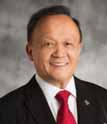
IA high-five for every effort
am so excited to have this opportunity to communicate with you every month in my new role as chair of The Rotary Foundation Trustees. When I look at the amazing work that the Foundation has ahead of it this year, I’m astonished. We are making such an enormous, lasting impact on the world. In the near future, polio will be wiped off the face of the earth — all because of you.
I see my role as chair much like the position I played in my high school basketball team. I was the point guard. It was my job to bring the ball up court and make sure my teammates received the ball when they were open. Nothing made me happier than to see them make shots.
We didn’t have the high-five back when I played, but I would have loved to give out high-fives for every basket. Now I’m eager to give them to you. Think about it: There is so much you can do to give a high-five to the Foundation. I started out by getting all five members of the Huang family in Rotary — my wife, three children, and myself — and keeping us donating year after year to the Foundation.
Now, let’s see how many high-fives all of us can give in the next year. Whether you write five more cheques, hold five more fundraisers, find five new donors, or simply give five more dollars, every high-five counts.
This year, I am going to fill my social media accounts with all the Rotary Foundation high-fives I give around the world and tell the stories of the generous people who are bringing us closer to our goals. Join me on Facebook (@garyckhuang) and share your stories. And feel free to give your own high-fives.
Let’s reach our goals and keep going. Clubs have great projects — they are counting on us. And the children of the world are counting on us. Right now — you’re open! Take the shot! Let’s make this the Foundation’s greatest year yet.
Gary C K Huang Foundation Trustee Chair
Dave King
Holger Knaack will become Germany’s first ever President of Rotary International when he takes up office in two years’ time. I caught up with him during the Rotary International Convention in Hamburg.
It was five ‘o clock on a sun-kissed May afternoon in the pretty SchleswigHolstein town of Ratzeburg, 40 minutes’ drive north-east of Hamburg.
Holger Knaack was tending the tidy garden of his home in this picture postcard town which rests on an island surrounded by four lakes; Küchensee, Stadtsee, Domsee and the larger Ratzeburg lake.
“I was in the garden, just looking around, not doing anything special,” recalled Knaack. “I wasn’t expecting anyone to call.”
But the phone did ring with news which was going to change his and wife Susanne’s life forever. News that Knaack, a former baker who once began his working life at the crack of dawn each day, had been elected President of Rotary International for 2020–21.
“It was a total surprise because the announcement was not due until the following day. The call was from Mike McGovern, chairman of the nominating committee. He said ‘I have the honour to tell you that the committee has selected you as the President for 2020–21’.
“It took some moments before I was able to answer Mike. I was speechless and breathless. It was so unexpected. I was not prepared for that call.”
The vacancy to lead the world’s largest humanitarian organisation had only arisen when Sushil Gupta from RC Delhi Midwest decided to step down as Presidentelect for 2020–21 earlier this year on health grounds.
Gupta would have been India’s fourth RI President, and for Germany’s first ever President, it was a bittersweet moment. Knaack wrote to Gupta
admitting that there were “dark clouds in his feelings towards accepting the President’s nomination.”
But Gupta replied by insisting his fellow Rotarian should not worry, enjoy the moment, and wished him all the best. “That makes it easier for me because I have Sushil’s support,” added Knaack.
He has been a member of Rotary for 27 years, belonging to Herzogtum LauenburgMölln Rotary. He was
previously a partner and general manager of Knaack Enterprises, a 125-year-old family business, and runs the real estate company, Knaack KG.
He has been married to Susanne for 43 years; the couple has no children and has been heavily involved with the Rotary Youth Exchange programme, receiving 43 students at their home over the years.
There is little doubt that becoming Rotary President is a life-changing
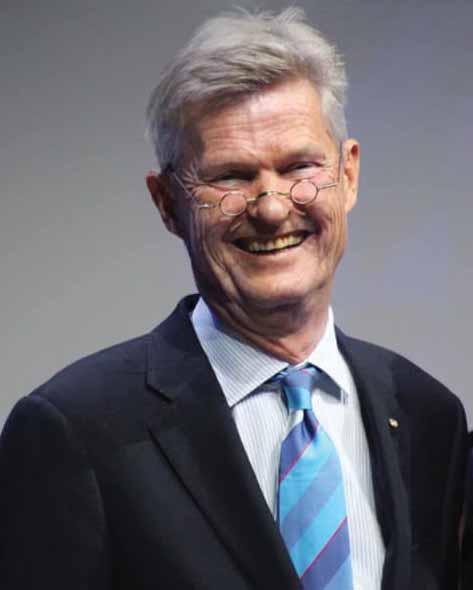
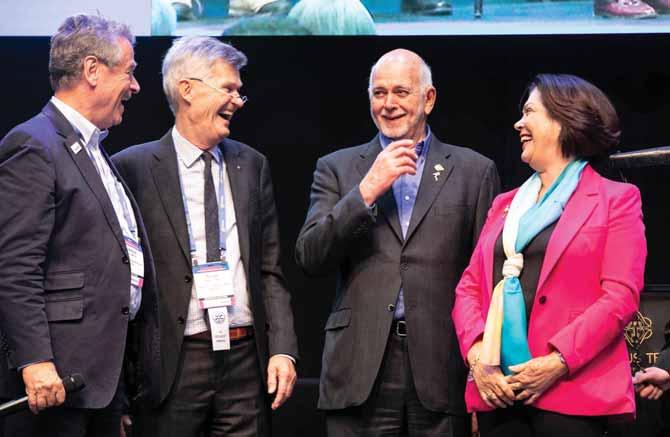
moment for Knaack and Susanne. He is both a proud German and a European, and suddenly pencilled-in plans, including a few Rotary trips, have been scuppered.
On his theme, he has a few months yet to think of it and a logo for his Presidential year. But already, two clear themes are emerging.
One is a desire to pursue the agenda begun by current RI President Barry Rassin to create more Rotaract clubs to broaden the diversity of Rotary’s membership.
The other is to encourage more young people and women to join
the organisation to take up leadership roles.
During his presidency, six women will serve on the Board of Directors.
When asked to predict when Rotary International will see its first female President, the German performed a neat, diplomatic side-step.
“That is a great question, and is one I have been asking myself,” answered Knaack.
“Bringing more women into Rotary is one of our core values, that is very simple, and we should honour those values.
“The Rotary Board has set us a high goal to increase the number of
women in Rotary and in leadership positions to 30 per cent by June 2023. But if we want to achieve something, then we have to set ourselves high goals.
“What I would say is that it is the duty of the nominating committee to choose the best. I don’t know who is going to go for President the year after me or who will be on the nominating committee.
“I don’t know who will be my successor, but I am happy with whoever they are. My successor is selected in a democratic way, so it would be unfair to suggest it would be good if my successor was a woman.”
He added: “I am honoured to have the confidence and support of Rotary’s 1.2 million members. As President, I plan to highlight the best Rotary has to offer where people of all backgrounds can see themselves reflected in our service and impact.”
“I am excited, of course, to be Rotary President. Without my wife Susanne, nothing would work, and you could not do this job. But we are both looking forward to the moment, and we are full of energy for the task ahead.”
The author is Editor of Rotary, Great Britain and Ireland.
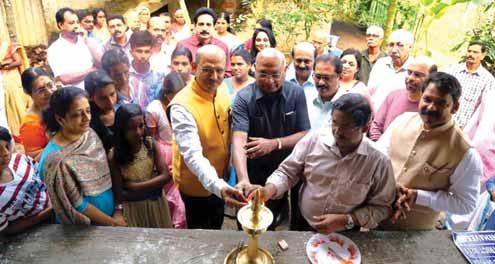
K S Sasi Kumar, R Reghunath, John C Neroth, DGE Thomas Vavanikunnel and PDG John Daniel. Mala
One can spot the Rotary wheel on more than 1,000 newly-built houses spread across the five revenue districts of Kerala that comprise RID 3211. The 139 clubs of the district have come together to construct 316 new houses
and complete pending work in 700 partially built houses under Snehaveedu — ‘a home for the homeless’ project which is the brainchild of DG E K Luke. With the successful completion of this mega housing project, Rotary

has reinforced the Kerala government’s Life Mission programme which includes ‘home for the homeless’ as one of the key objectives.
A district seminar, last July, on Snehaveedu was a big success with participation

of 1,000 Rotarians. “On the same day, new Rotary houses were handed over to ten families by the State Finance Minister T M Thomas Issac,” recalled Project Chair K Babumon. With Rotarians’ support and generous CSR funding, the initial target of 500 houses was revised to 1,000 units.
RI Director C Basker along with his spouse Mala inaugurated three new houses a few months back.
The Snehaveedu project was implemented by a committed team led by Babumon with support PDGs K S Sasikumar, K P Ramachandran Nair, Associate Governor M Ajit Kumar and District Secretary General N Shine Kumar.
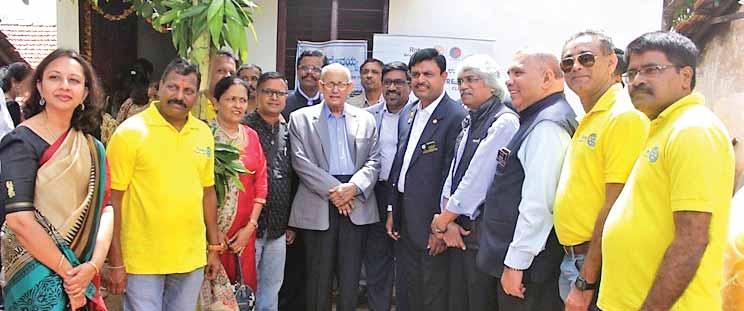
Duringthe devastating floods that hit Kerala and Karnataka last year, in the Kodagu district of Karnataka “more than 3,500 hectares were devastated due to landslides, damaging about 2,500 km of roads and rendering over 1,000 families homeless, as their homes had been destroyed,” says PDG K Ravi Appaji, RID 3181.
Under the leadership of DG P Rohinath, and Appaji, who was designated Project Chairman of Rebuilding Kodagu, and DRFC PDG K Krishna Shetty, Rotarians of District 3181 came together to rebuild homes for the homeless. “With help from PRIP Kalyan Banerjee and RID C Basker, we signed an MOU with Habitat for Humanity
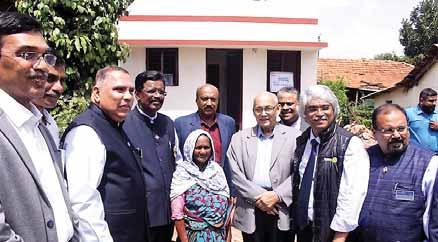
India to build 25 homes in the first phase at Rs 5 lakh per home. The total cost of the project is Rs 1.26 crore,” he says
For the first phase, 25 beneficiaries who had ownership of the land were chosen in Madapur village, 12 km from Madikeri, as it had suffered intensive damage due to rains. Bhoomi pooja was done on Feb 14, construction started on Mar 28 and on June 18, just three months later, the homes were completed and handed over to the beneficiaries by PRIP Kalyan Banerjee.
Dedicating the homes to the beneficiaries, Banerjee complimented the Rotarians for doing a fine job and building homes with a foundation strong enough to enable them to add one more storey later. He thanked Habitat for Humanity India and promised his help and support in building more homes for the flood-ravaged. “A home always brings hope, stability and comfort to the family, and ensures that after a natural disaster the affected people can carry on with their lives,” he said.
DG Rohinath, PDGs Appaji, Krishna Shetty, RID 3182 DG Abhinandan Shetty, Rajan Samuel, MD Habitat, DGE Joseph Mathew, DGN M Ranganath Bhat and RC Bangalore Orchards President D Ravishankar were present at the event.
V Muthukumaran
India can emerge as the bread basket of the world if only we can revert the natural elements of soil, river and air to their natural quality. The Indian subcontinent is the most fertile land in the world with its per-cubicfoot of soil having more than 10,000 microorganisms, said Sadhguru Jaggi Vasudev, the founder of Isha Foundation, addressing the Inter-city General Forum (ICGF) in Bengaluru, an annual event of RID 3190.
He formally launched Koti Nati, an ambitious project of planting one crore saplings in the Kolar and Chikkaballapur districts of Karnataka over a three-year period.
The time had come to fix our ecological problems and Mother Earth must be nurtured back to health if we want humanity to be energised and creatively occupied. If the present crisis is not tackled, around 40 per cent of India’s total land will have natural manure of less than 2 per cent

with disastrous consequences, said the Sadhguru. Citing the success achieved in creating awareness through Rally for Rivers campaign across the country, he said, “it should be a decade of action to revive rivers by planting trees on the banks and water basins instead of creating check dams or storage tanks.” He said 35 per cent of India’s land area must have green cover to rejuvenate the soil and dying rivers. The Isha Foundation has given a 76-page recommendation to Niti Ayog which is
From L: RC Rajmahal Vilas President Rajaram Krishnamurthy, Koti Nati Project Mentor K Amaranarayana, RC Bangalore Orchards President D Ravishankar, Isha Foundation Founder Sadhguru Jaggi Vasudev, Anita Hari, DG Suresh Hari, DGE Sameer Hariani, Roopa Hariani and DGND Fazal Mahmood.
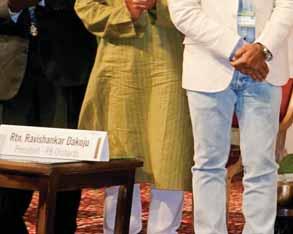
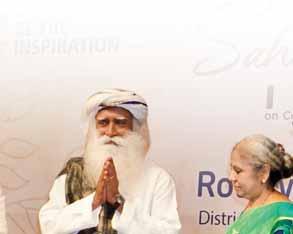
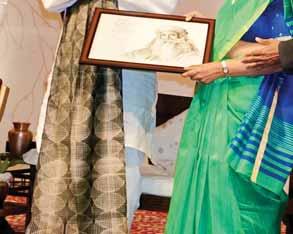
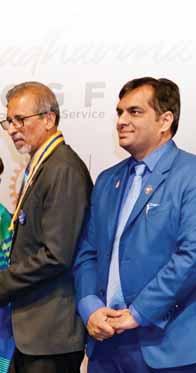

With the Karnataka government extending its support to the afforestation project, the MNREGA funds will be routed through gram panchayats for planting saplings in their jurisdiction, said Project Mentor K Amaranarayana. The Paola Dakoju Ravishankar Foundation has given `1 crore as seed money for this project.
“The tag of Hasiru (green) Conservation programme of the State will be extended to Koti Nati too and funds will be drawn from this official scheme. Apart from
donations from the clubs and Rotarians, we are also tapping CSR funds,” said Rtn Neil Michael Joseph. His company, Baghirathi Travels, will contribute generously and manage the logistics part of Koti Nati in the two districts.
The planting of one crore saplings is expected to be completed by July 2020. RC Bangalore Orchards has roped in district magistrate offices, gram panchayats and the Forest Department for the plantation drive.
“During the year-long pre-launch campaign, we engaged farmers, district officials and distributed booklets
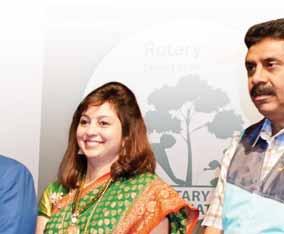
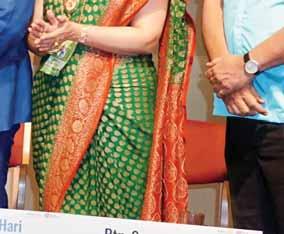


and pamphlets to the villagers for creating awareness,” he said.
To green the hills, “we will seed bomb the barren mountains spread across the two districts either by an IAF chopper, glider or drones,” said D Ravishankar. As the cost of a seed ball is ` 1, ten crore seed balls would cost `10 crore, and “we will bear this cost as well as the cost of dispersal.” After planting one crore saplings in the two districts, “we will repeat the same in Tumkur and Chamarajanagar districts,” he said.
being circulated to all States for taking proactive steps to restore rivers.
He pointed out that only 4 per cent of the rivers originate from the Himalayan glaciers and the rest are created from within the country.
The Sadhguru urged Rotary to take part in the Cauvery Calling movement which he will launch this September. “Both Tamil Nadu and Karnataka governments have agreed to be part of this massive campaign to revive at least 34 per cent of the Cauvery basin which has gone dry by strengthening and nourishing the tributaries that feed this huge watershed,” he said.
In his address on the theme Dare to Dream , RC Bangalore Orchards
President D Ravishankar said Koti Nati (one crore plantations) has two components — one crore plantations in the two districts over two phases and dispersal of 10 crore seed balls on the barren hills of the Eastern Ghats to revive five rivers which had totally dried up. “Koti Nati will be the perfect cure for the green challenges facing us — climate change, global warming and plastic menace.”
He said the club is also working on the Rally for Peace campaign from Kanyakumari to Wagah border which will kick-off from Sep–Oct this year with the aim to forge better IndoPak relations.
Koti Nati Project Mentor K Amaranarayana, a former IAS officer, said 36 lakh saplings were ready for plantations across the
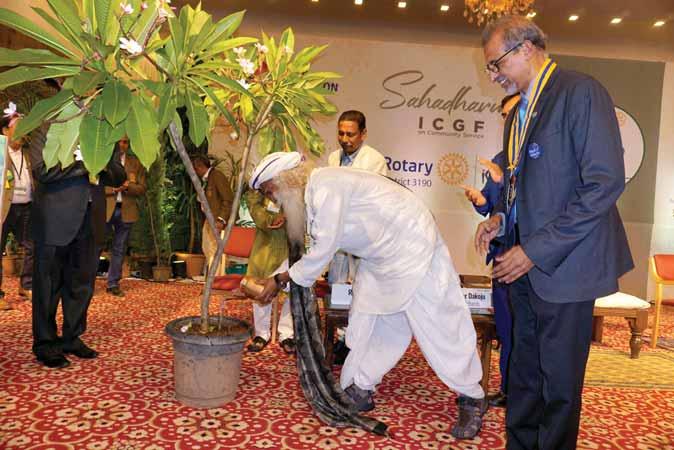
Sadhguru Jaggi Vasudev symbolically launches the Koti Nati project at the ICGF as Rtn Ravishankar and DG Suresh Hari look on.
1.5 lakh acres in the two districts and it will benefit about 40,000 farmers in 313 gram panchayats. “These saplings will be planted by July 15 before the onset of monsoon, with the balance taken up in the second phase.”
A 14-month campaign was done through advocacy, awareness and publicity drives among farmers of the two districts. “We have received 20 lakh applications from Chikkaballapur farmers and are collecting the same from Kolar as they too are eager to be part of Koti Nati,” said the mentor. Planting will be done on government land, schools, offices and on roads, burial grounds, etc.
Community service is the heartthrob of Rotary and this forum has done well to display and disseminate the
projects and activities of the district clubs through 80 exhibition panels and 15 stalls at the pavilion, said DG Suresh Hari. He complimented ICGF Committee Chairman Mahadev Dambal and District Community Services Director B K Bhaskar for organising the mega event that created a record in the number of registrations.
Listing out the district projects, Bhaskar said, “we saw a big leap in blood donation camps and health camps this year. We have collected around 45,000 units of blood.”
Whether it is Happy Schools, building toilet blocks, anganwadi support or rebuilding schools, the district clubs have taken performance to a new level, he noted. So far, 50,000 eye camps were held for children, besides 1,000 cataract procedures, 5,000-plus dialysis sessions and
10,000 paediatric heart surgeries at the Jayadeva Hospital.
DGE Dr Sameer Hariani administered a pledge to the delegates that they would nurture Mother Earth with each Rotarian planting 100 saplings in the neighbourhood and make all efforts to take Koti Nati to other parts of the world.
PDG Dr S Nagendra spoke on the medical missions to Africa undertaken by Indian doctors and volunteers. Three parallel sessions on the six focus areas of Rotary preceded the main event. Hosted by RC Rajmahal Vilas, the conclave was attended by 1,500 delegates from 100 clubs in the district.
Club President Rajaram Krishnamurthy welcomed the delegates.
Pictures by V Muthukumaran
To help students prepare for various competitive exams conducted at State and national levels for government and other jobs at banks and railways, RC Bhavnagar, RI District 3060, has set up an e-library in the heart of the city. The Rotary Dr Ramaniklal J Mehta E-Library has a seating capacity of 60 people and is fully air-conditioned. Equipped with computers this place allows free use of internet to download unlimited study material and fill up online application forms for exams. A printer and scanner are also available at the library. The library contains more than 1,200 books including study material for 75 competitive exams.
“Our club always wanted to set up an e-library. This dream was made possible when we received a donation from our member
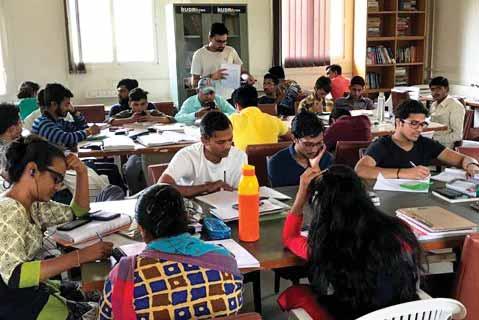
Dr Pankaj R Mehta and his family,” says Club President Manish Kothari. Qualified librarians assist students. Mock tests and English grammar classes are conducted to prepare the youngsters for competitive exams.
Currently 700 students are registered members of the library. “We are happy that close to 50 students who have used the library have secured jobs in government and governmentaided organisations,” adds Kothari.
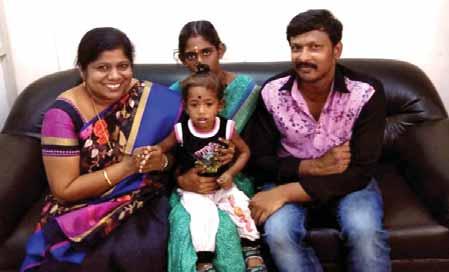
RCMadras Chennapatna, RID 3232, , has been facilitating treatment of congenital heart diseases in children from underprivileged families for over two decades now at the MMM Hospital in Chennai. This has benefitted nearly 200 children so far. Every year seven children are identified and provided free surgery. The project is supported by RC Tebrau, Malaysia, who have created a corpus for the surgeries. Sixteen-month-old Pragadeeswaran was the fourth child to be operated this Rotary year in May.
Jaishree
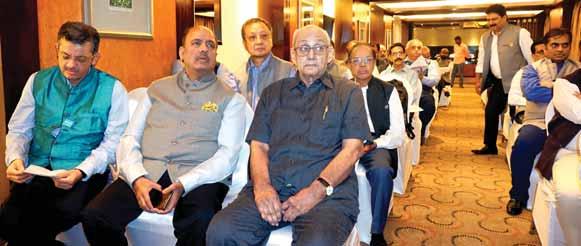
Aone-day orientation workshop was held in June in Chennai for the incoming DGs where senior leaders — RID C Basker, RIDEs Bharat Pandya and Kamal Sanghvi, TRF Trustee Gulam Vahanvaty, PRIP Kalyan Banerjee and PRIDs Shekhar Mehta and Y P Das — addressed them on aspects such as membership development, stewardship and election issues, literacy and the new enactments passed in the recently concluded CoL. The meeting enabled the incoming district leaders to discuss various aspects with the senior leaders at close quarters.
“Create your own walk and talk. Your actions must inspire your team to excel in all activities,” said RIDE Sanghvi and urged the district leaders to plan programmes to commemorate the centennial celebrations to be held in February 2020 in Kolkata in the presence of RI President Mark Maloney.
Both the incoming directors urged the delegates to dream big and implement bigger and sustainable projects in their respective communities. “People look up at
Rotary with immense faith and hope that we Rotarians will find solutions to their challenges and it is up to us to honour their faith and fulfil their expectations. Each one of us is the face of Rotary,” said RIDE Pandya.
RID Basker, talking on leadership qualities, said that the governors are the role models for the district team including the club presidents and secretaries and “you are the closest tier that your team looks up to. So be careful in your words and deeds. Motivate them to deliver more than what they think they can.”
TRF Trustee Vahanvaty urged the district leaders to spend the district grants purposefully and not hoard the money “which act will not help anyone in the long run. The money is sanctioned by the RI Board for you to execute meaningful projects. So use it diligently and for the purpose it is meant for.”
PRID Das, the Chair of Rotary India National TB Control and Awareness Committee, prevailed on the governors to raise awareness among Rotarians, people and local doctors on TB and the need for
its early diagnosis and treatment. Health camps can include screening for the disease and awareness sessions particularly in rural areas, he said and suggested districts to appoint District TB coordinators. Making note of a report that 75 per cent of Indians die due to noncommunicable diseases (NCDs) such as diabetes, BP and obesity, he said, “it is time Rotary addresses such issues through a ‘Stop NCD’ project,” to which Dr Pandya added that districts can promote the ‘One spoon less’ project aimed at cutting down on sugar and salt which are the catalysts for NCDs.
Jatinder Singh from the RISAO spoke on membership and election pilot. PRIP Banerjee gave an insight into the genesis of the Rotary India Literacy Mission and its Chair Shekhar Mehta explained the various aspects of TEACH and urged the governors to focus on child development and adult literacy among others. He updated the delegates of the various achievements met by RILM and lauded the Inner Wheel clubs for their overwhelming support.
RI has developed a toolkit to help Rotarians engage with younger professionals. It will help to motivate and inspire emerging leaders to get involved; connect with Rotary clubs, promote their efforts in local media and use social media to connect with younger audiences; attract new members including younger professionals; engage with members and provide lasting value to members by making sure their club experience remains positive.
The toolkit is available on www. rotary.org/engaging-younger-professionals-toolkit.
In April, the Trustees approved changes to the areas of focus to offer greater clarity on global grant eligibility, additional project types, and activities that focus on the environment. The Trustees kept the existing six areas but adjusted
three names (noted with an asterisk) to better reflect the types of projects that Rotarians are carrying out. The updated area names, effective from July 1, are:
Peace building and conflict prevention*
Disease prevention and treatment
Water, sanitation and hygiene*
Maternal and child health
Basic education and literacy
Community economic development*.
The updated Areas of Focus Policy Statements is available through My Rotary. For further clarification contact: grants@rotary.org or aof@ rotary.org
Beginning July 1, Rotary exchange rates will be based on
the prevailing market rate as of the first of each month, and will not be sent in advance. Please refer https://my.rotary.org/en/ exchange-rates .
Inclusion of new areas within CSR activities
The Ministry of Corporate Affairs has notified further amendment to Schedule VII of the Companies Act, 2013, for inclusion of new areas within CSR activities which has come into force on May 30, 2019. The amendments seek to include disaster management, including relief, rehabilitation and reconstruction activities under CSR. Before the said amendment, contribution to any disaster management/relief activities was not specifically covered in the schedule except for the PM’s National Relief Fund.
without protien powder, without tablets, without Juice and honey, with out even exercise.
Here comes DR. Sheban MBBS.,DCH, post graduated from India’s most reputed Madras medical college. We give your own home made food based, Balanced diet chart.
We make lean and overweight diabetes patients to STOP diabetic medicines .. gradually, by giving a Balanced diet chart.
If you lose weight benefits for hormone problems, Pcod, menstural problems, more hair in face in girls, pimples, having no babies, thyroid problems, high bad cholesterol, high BP, fatty liver, gallstones, knee joint pain, high blood sugar, hair loss, constipation, male sex problems, childhood obesity, migraine .... can be benefitted.
Benefits if you loss weight hormone problems, Pcod, menstural problems, more hair in face in girls, pimples, having no babies, thyroid problems, high bad cholesterol, high BP, fatty liver, gallstones, knee joint pain, high blood sugar, hair loss, constipation, male sex problems, childhood obesity, migraine .... can be benefitted.
Palliyady... weight loss clinic.
Click red Subscribe button in youtube .. DR.Sheban clinic. Like us at Facebook .. DR.Sheban weight reduction clinic
To know more, whatsapp us : +91 9443487004
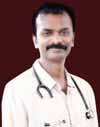
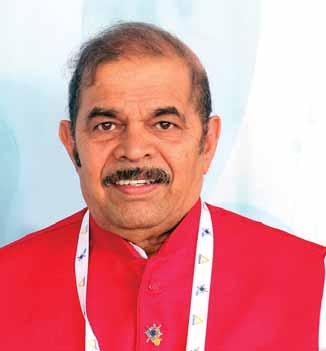
Storage material manufacturer
RC Poona North RID 3131
Iwas compelled to become a Rotary member in 1990 by the late Rtn Dharav who was a GSR then.
I respected him greatly and agreed,” says Ravi Dhotre, So when did he start enjoying Rotary? Two years later “when I became president. But the moment I cherish the most really came in 2014–15 when I signed an MoU with Tata Technologies for a `10 crore-funding for an e-learning project in the presence of then RI President Gary Huang.”
His plans for the year include creating 100 Happy Schools, donating 1,000 cows, 1,500 e-learning kits in schools and setting up a Rotary hospital in Pune. On membership, Dhotre is confident of bringing in at least 900 new members and adding 15 new clubs. “We have over 1,000 women Rotarians and I am proud to say that 30 women will be leading their clubs during my year and of the 30 assistant governors, eight will be women.”
The DG is planning to raise $1.5 million for TRF and introduce two AKS members and 100 Major Donors.
He comes from a family of Rotarians; his wife Jeyashree, sons and daughters-in-law are all Rotary members. “I have five past presidents in my family,” he says with pride.
Accountant,
Ramesh B N has suggested to all the 85 clubs in the district to install one Rotaract club during the year. He wants to implement five signature projects — sponsoring e-learning facility in 100 schools, disbursing two lakh seed balls to green the planet, promoting breastfeeding among mothers, career guidance camps to benefit one lakh youngsters and skill development programmes across the district. “We have CSR partnerships for all the above projects,” he says.
Apart from these projects, he is keen on promoting road safety awareness among
school students and implementing a significant number of WinS programmes.
He wants to increase the membership in his district, currently at 3,200, by 10 per cent and his goal for TRF contribution is $200,000. The region comprising parts of Karnataka is a rural belt so not much can be expected from the people here, he says.
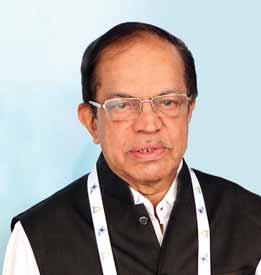
Ramesh became a Rotarian in 1981, inspired by his friends who were Rotary members. His son, V R Ashwin, is a member of RC Bangalore, RID 3190.
G Chandramohan
Automobile parts manufacturer, RC Madras Northwest, RID 3232
He is excited about the “Pink Auto” project that will empower underprivileged women. “We want to make women financially independent because most men waste their earnings on alcohol, and the entire family suffers. We will teach women to drive autorickshaws, get them a licence and also help them buy the vehicle. Then, of course, it will be their show,” he says with quiet pride.
An avid convention attendee, Chandramohan discussed this project fruitfully with delegates at the recent Hamburg Convention. Clubs are coming forward to support funding of autorickshaws for women drivers, either directly or through interest-free microloan schemes. This will do good for Rotary’s PR as the pink autos will sport the
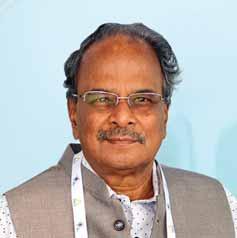
Rotary wheel. He plans to launch an app on the lines of Ola or Uber for easy hailing of the vehicles by commuters. Conducting medical camps in places of worship and at least 20 monthly medical camps over the year in rural areas are his other plans. For TRF he aims to raise $1.5 million, including $1 million for the Polio Fund, through a campaign — $2 for 2 drops for the final assault on Polio.
On membership, Chandramohan wants to increase the number from the present 5,000 by another1,200 new members including 250 women Rotarians. He is happy that of the 120 presidents, 22 are women. He joined Rotary in 1993, and wasn’t “a great foot soldier for social work. But Rotary made me care for humanity. Today I am an endowment donor, having contributed $35,000 to the Foundation.”
Zameer Pasha
Surgeon, RC Trichirapalli Midtown, RID 3000
He served as an Interact President in 1969 when he was 12, a Rotaractor of Madurai Medical College, after which he became a Rotarian in Trichy. “But I was an ‘outstanding’ Rotarian,” laughs Zameer Pasha, as he explains, “I was hardly in India, most of the time away in a foreign land for further studies, and in 2010, when I was asleep in Zurich, I got a call from my club informing that I was chosen president for the next year.”
Pasha shares an idea that will “take care of retention of members.” He has planned a corpus for Rotarians where each one contributes a certain sum which will be handed over to the family of a Rotarian in the event of his death. “This fund will be of great use to them to tide over initial expenses after the calamity. He/she should have been a member for
five years at least to be eligible for the programme,” he says.
He has planned 10 projects to be implemented during his year. The first is a mega blood donation drive across the district. “Being a doctor I, more than anyone, recognise its value.”
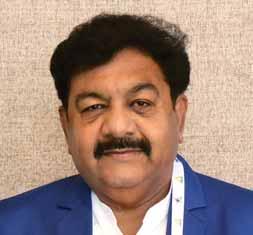
His target for membership is to increase the present 5,500 number by 10 per cent and add 50 more women to the present team of 450 women Rotarians. He is proud of the women members. They are vibrant and are actively promoting WinS, TEACH aspects of RILM and the new solution to menstrual management, the menstrual cup among adolescent girls, he says.
He aims to raise $2.05 million for TRF.
S
Sheik Saleem
Educationist, RC Courtallam Central, RID 3212
Rotary’s scientific planning and administration attracted him to Rotary in 2002 and soon enough he was excited to serve as a Matching Grant Coordinator. “I got hooked to the organisation when in one such project we screened 70,000 children from 119 schools,” says Sheik Saleem. His focus for the year includes implementing WinS projects and enhancing water sources with the support of district grants worth ` 30 lakh and a global grant to set up dialysis centres across the district.
Reaching out to 1,000 children with CHDs will be another signature
project through Save the Children programme and another ongoing district project, since 2013, called Golden Hearts , being performed in association with the Apollo Children’s Trust.
With a grand district slogan — Know, Learn Rotary, Love Rotary, Share Rotary, Enjoy Rotary and Celebrate Rotary — Saleem aims to take Rotary to Rotarians and create a passion in them for the organisation.
He is planning to increase the district membership by 10 per cent and charter 6–8 clubs, and is confident of raising up to $330,000 for TRF.

Inspired by the words of Rotary’s founder Paul Harris, which stressed upon the value of a “good Rotary book”, Rotary Club of Bombay, RID 3141, has put together a book illustrating its history of 90 years titled ‘A Living Legacy’. The book was released
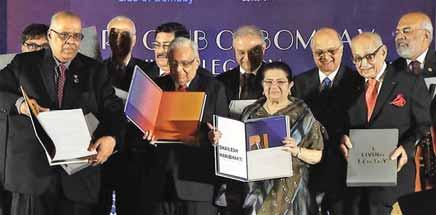
Chairperson of Aditya Birla Centre for Community Initiatives Rajashree Birla at the book launch with PRIP Kalyan Banerjee, TRF Trustee Gulam Vahanvaty, DG Shashi Sharma and RC Bombay President Vijay Jatia.
by the Aditya Birla Centre for Community Initiatives and Rural Development
Chairperson Rajashree Birla at a glittering event presided over by Maharashtra Governor C Vidyasagar Rao.
The club’s president, Vijay Jatia, said he was a Rotarian for seven
Tyears and his life had “changed” once he joined Rotary. PRIP Kalyan Banerjee and RID 3141 DG Shashi Sharma participated in the event. A short movie, giving a glimpse of the world of Rotary, was shown at the meeting.
he residents of MGR Nagar in Pattamadai village in Tirunelveli district of Tamil Nadu are a happy lot as RC Tinnevelly, RID 3212, has gifted all the 38 households with a toilet. The colony with 70 households is now open-defecation-free, beams the club’s TRF Grants Chair P Satheeshkumar. The village is famous for its flexible and soft mats woven from korai grass (reed plant).
The toilets costing $40,458 were completed with the support of a global grant involving RCs La Crosse Valley, La Crosse Downtown, RID 6250, USA, and TRF.
PDG Dr Chinnadurai Abdullah addressed the beneficiary families and resourcepersons from the Government Medical College, Tirunelveli, and educated them on the maintenance of toilets and the health hazards of open defecation.
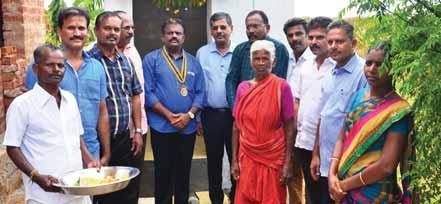
PDG Chinnadurai Abdullah (sixth from right) and RC Tinnevelly President P Chockalingam with beneficiaries.
Last year the club had constructed toilet blocks and handwash stations, and provided a sanitary napkin incinerator to the 125-year-old Ramaseshier School, adjacent to the colony. These are benefitting nearly 500 boys and 250 girls. “That was one of our commemorative projects to celebrate our club’s 75-year milestone
last year,” says Satheeshkumar. Back then the club had the support of the same international partners and “so impressed were our US partners Sondra and Roger Legrand, who had visited the project site for the inauguration of the toilets in the school that they organised a fundraiser on their return to the US,” he adds.
Yet again the magic of TRF is at work with RC Faridabad, RID 3011, through a global grant project setting up an operation theatre and Cardiac ICU for treating poor children at the Sathya Sai Sanjeevani Hospital at Bhagola in Haryana.
The OT and ICU, installed with support from RC Fort Wayne, US, RID 6540, were inaugurated by DG Vinay Bhatia and IPDG Ravi Chaudhary in the presence of PDGs Vinod Bansal, Sudhir Mangla, Dr
N Subramanian, DGE
Suresh Bhasin and DGN
Sanjiv Rai Mehra.
With the addition of OT and ICU Centre, the hospital, which earlier could treat only treat 2–3 children a day, will now reach out to more children.
Out of the total project cost of $413,068, the club has contributed $78,750, while the balance amount came from its global partner and TRF.
A unique aspect of this hospital is that there is no billing counter as the surgeries are done

free of cost and attendants are given free meals and accommodation. The
Hospital Chairman C Sreenivas thanked Rotary for the facilities.
TheRotarians of RC Nilgiris, RID 3202, recently organised a greening drive at the crematorium campus in Wellington. The LPG crematorium called Sorga Bhoomi
was built by the club in 2005 through generous contributions from members. The sapling plantation was part of the renovation work undertaken at a cost of `30 lakh, said Club President
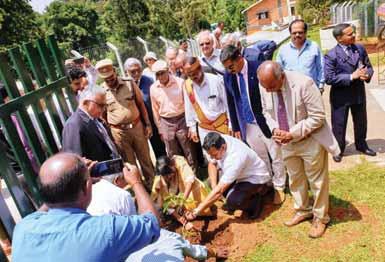
Tini Korah. The upgraded aesthetics included fencing and landscaping with bright flowering plants.
The dignitaries at the rededication programme included the Nilgiris District Collector Innocent Divya, astronaut Rakesh Sharma and defence officers from the Madras Regimental Centre. Interactors from the Laidlaw Memorial School, Ketti Valley, Mrs Bullmore’s Matriculation School and St Mary’s Girls Higher Secondary School, Coonoor, were present and their presidents too planted a sapling each. Dr T S Chhabra who has completed 50 years in Rotary and past Rotarian Chanduru Raju Bettan, who was the mentor for the whole project in the early 2000s, were some of the other delegates who participated in the event.
V Muthukumaran
The Rotarians of RC Mapuca, RID 3170, are happy that their club’s maiden effort to provide bionic upper limbs to eight beneficiaries through the Robotic Arm camp has been successful. “The recipients are the sole breadwinners of their families. This initiative is carved out of the club’s 22-year-old Jaipur limb fitment programme which has been catering to leg amputees,” says Club President Ajay Gopinath Menon.
DG Ravikiran Kulkarni and AG Prakash Pilankar inaugurated the Robotic Arm camp in May to mark the 54th charter day of the club, which is the second oldest in Goa after RC Panjim. “We tied up with the ortho and plastic surgery departments of the government medical college for this
global grant project. They identified 28 beneficiaries who are in dire need of such a fitment,” said Menon.
Unlike the LN-4 prosthetics which is a basic claw-type and mechanical device, the robotic arms supplied by the German company Ottobock have computer sensors to process the stimuli passed on by the muscular system in conjunction with the brain to act as directed by the central nervous system. “All types of hand movements can be done with robotic arms. Each fitment is customised based on the specific needs of the upper arm clumps of the beneficiaries.” Two officials from the German company in Mumbai came down for the camp and took the upper limb measurements of the beneficiaries and “once the prosthetics
arrive from the parent firm, they will be given a two-week training to use them.” With each prosthetic costing `3.25 lakh, the club raised `26 lakh ($37,500) through a global grant done with its international partner RC Francisco Beltrao, Brazil, RID 4640. “On our part, the club mobilised $14,750 through contributions from members,” he added.
The Jaipur limb fitment programme being run by the club for over 22 years at the Rugnashray Centre in Bambolim has benefitted 1,600 amputees so far.
Free cataract surgeries are being done for at least 30–40 needy people each year. Besides, the club holds a general medical camp each month to treat various ailments.
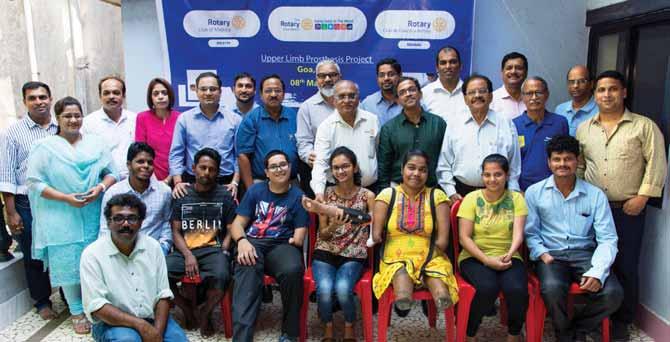
The following committees are searching for qualified candidates for openings in 2020–21. All committees correspond via email, teleconference, or webinars as needed, and some also involve at least one mandatory in-person meeting per year. To be considered for committee membership or to recommend someone for an appointment, visit on.rotary.org/application 2019.
Applicants must be registered on My Rotary at rotary.org/myrotary and their My Rotary profile should include current contact details. Candidates may apply for only one committee. The application deadline is August 12
Communications
Finance
Leadership Development and Training
Advises the Rotary International Board on communication with key audiences
Advises the Board on Rotary’s finances, including budgets, investment policy and sustainability measures
Advises the Board on Rotary’s leadership training programme for Rotarians, clubs and districts with special emphasis on training for DGs.
Operations Review Monitors the effectiveness, efficiency and implementation of operations and all internal systems; advises the Executive Committee on compensation matters; and performs other oversight functions as requested by the Board
Rotaract Advises the Board on Rotaract; develops the Rotaract Preconvention programme
Professional background and experience in a communicationsrelated field
Professionals in finance; nonprofit experience preferred. Candidates must have experience in matters at the club and district levels
Must have significant training or education experience with a preference for leadership development
Experience in management, leadership development, or finance and good knowledge of Rotary’s operations. Appointments will be limited to PRIDs.
Rotarians with experience as Rotaract/Interact mentor, adviser or district chair. Rotaract alumni are strong candidates.
Rotaractors: Leadership at the club, district or international level. Candidates must have served as DRR, organised projects or attended a Rotaract Preconvention. Age restrictions may apply.
One three-year term; multiple conference calls; annual meeting in Evanston
One three-year term; two meetings per year in Evanston
One three-year term; annual meeting in Evanston
One six-year term; typically meets in Evanston twice a year
Strategic Planning Reviews Rotary’s strategic plan and associated measures; advises leadership on other matters of long-term significance
10+ years of experience in strategy development, monitoring and implementation, and strong understanding of RI and Foundation programmes.
Rotarians: One three-year term; annual meeting in Evanston
Rotaractors: One one-year term; one meeting in Evanston
One four-year term; up to four meetings in Evanston.
@The Rotarian
Narendra Mal Mathur (centre) with child patients and their families. Other club members including past president PC Sanghi, Club President Dr Prabha Luhadia and Secretary Rajendra Tiwari are also present.
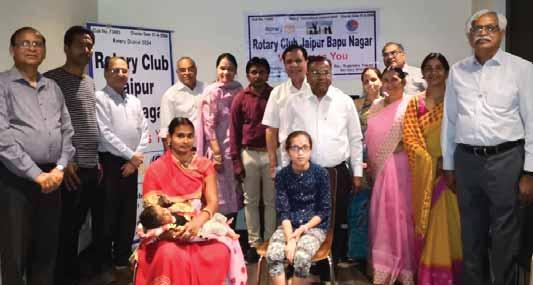
Three children suffering from congenital heart disorders got a new life after successful treatment at the C K Birla Hospital in Jaipur. Their families are so poor that they could
not afford the treatment cost. Rotary came to their rescue.
Narendra Mal Mathur, a charter member of RC Jaipur Bapunagar, RID 3054, has signed an MoU with DG Neeraj Sogani at
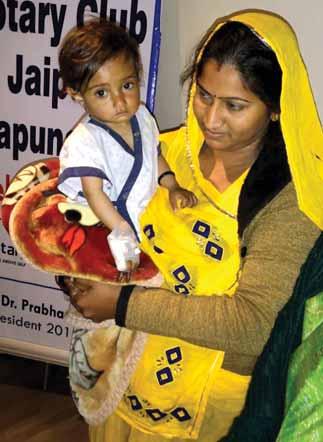
a CSR seminar organised by the district in January this year for sponsoring paediatric cardiac surgeries for 4–5 needy patients every year.
The treatment cost of `4 lakh for each child is being taken care of by Mathur who himself has undergone two cardiac surgeries. “The fact that I survived these surgeries is sign that God wants me here for a purpose and that would be to save little children’s lives,” he says, adding that that is what has inspired him to sponsor generously and “Rotary has given me the platform for doing that.”
Mathur retired three years ago as the CMD of Rajasthan Rajya Vidyut Utpadan, Department of Energy, Rajasthan Government. He lost his wife in 2016, and is living
with his son. “I don’t have any commitment now and am free to spend my earnings for the cause of helping others. Nothing can beat the joy of seeing a child come back alive and healthy after surgery,” he smiles.
Cardiac surgeon Dr Alok Mathur who treats children with CHD at the hospital has also waived his fees for this cause. When he identifies a child requiring treatment, he immediately contacts Mathur for help.
“Rotary is meant to implement bigger projects, beyond distributing school bags and stationery or organising blood donation camps. It’s time we start delivering bigger projects and Jaipur Rotarians have the means to do so,” says Mathur who is the club’s vice president.


How a passion for doing crosswords ended up being the perfect therapy for my mother.
Idon’t know why,” my mum said a few months ago, “I am crazy about crosswords. I can’t seem to stop.” This was by way of explanation for her request for more crossword books, yet more crossword books. Over the last few months I had already raided all the nearest bookshops for them. “I like word search books too,” she said. “I love word games.”
Amma passed away exactly three weeks after her 85 th birthday. Desperately scouring the bookshops for the gifts she liked best, I managed a major haul of word search books at our local Odyssey. When I presented them to her early morning on May 1, her smile was something to live for. She was delighted beyond those words she loved. She immediately squirrelled them away for later after she had burrowed her way through the pile of material on the table beside her chair.
And that’s exactly how countless people remember her after her passing, especially those who had made her acquaintance over the last few years. Finally released from her responsibilities of caring and cooking
for a large family, she could devote time to her favourite pastime. She would sit comfortably in a large, maroon sofa, hunched over a page of crosswords or word searches. That’s the image impressed in people’s minds: a lovely but frail woman, reading, doing crosswords or, if she caught their eye as they passed by or came visiting, a warm smile.
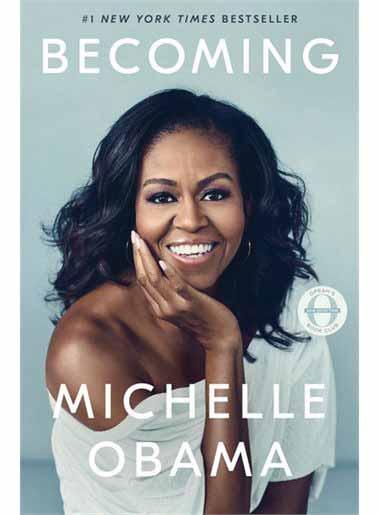
A year ago, I bumped into a doctor-friend whom I hadn’t met in years. When I told her about Amma’s Parkinson’s and her hobby, she said, “That’s the best. The best medicine.” Certainly, even as her body slowed down, her mind remained sharp and active. Doing crosswords was great for her brain. In fact, in addition to all the books, the only gift she wanted, she tackled the puzzles in four separate newspapers as well. That’s pretty good exercise for the brain, alright.
Recently I stumbled upon an article in Lifehack in which Sumaiya Kabir writes that solving crossword puzzles has the potential to improve memory and brain function in older people. Amma was the perfect proof of this. She surely was saved from the greater ravages of the disease for a longer time because of her hobby.
How does doing crosswords help? Kabir’s research offers some explanations. Take Alzheimer’s, for example. Kabir says that according to Alzheimer’s Association, a “daily dose of crossword puzzles is a significant way to keep the brain active and sharp.” If the
elderly person is in a position to get together with others of the same mindset, it’s even better: solving them in a group triggers bonding apart from being good for thinking and talking.
Also, it’s not only the young who grow their vocabulary; we do it all our lives. Besides, the activity helps focus and you forget what other problems you might have. I’ve seen my mum at it and I can vouch for this. She wouldn’t rest until she had found the answer: sometimes she would ask me — not that that was any help to her! — but most of the time the answer would suddenly dawn. These were her Eureka moments.
Talking about problems, solving crossword puzzles actually helps the mind think clearly. And that’s what we need to do if we are to solve the many issues we’re confronted with in life. As Kabir puts it so well, “if you can understand the pattern of a puzzle, you can easily understand the patterns of life.”
Most important of all, this is a fun way of dealing with boredom. Believe me, that’s the biggest challenge of old age. As my grandmother used to say, and my mother used to quote every now and then: You can manage anything in life but spending time in your old age is very difficult. My mother took her mother-in-law’s observation to heart and it helped. Apart from doing word puzzles, she would also read. Indeed, she was like a dog with a curly tail: I’ve finished this one, give me another book to read, another book to read!
What were some of the books she read recently? Well, there was Becoming by Michelle Obama, yes! She loved The Forest of Enchantments by Chitra Banerjee Divakaruni. Ever the crusader for women’s rights, Amma identified with Sita’s questioning of Valmiki’s Ramayana in the novel. She

found it difficult to read books that were hardbound or thick, and in this instance, both books were both of these things. But that didn’t prevent her from making a go at them. Becoming had a third issue: the font was tiny. However, Amma’s natural curiosity about people and their lives helped her set aside the handicap. She also enjoyed Twinkle Khanna’s Mrs Funnybones and giggled hysterically over Moni Mohsin’s tongue-in-cheek observations of Pakistani high society and politics in The Diary of a Social Butterfly and Return of the Butterfly.
The thing is, Amma’s love for books, reading and doing word puzzles meant that she didn’t need to be entertained. Of course, she loved it when people, especially people she felt comfortable with, visited. But as her hearing deteriorated, she found solace in her hobbies. This is not to say she was never bored or restless: she was, sometimes. But books and puzzles helped her tide over those difficult moments. That’s a big lesson Amma taught me, important enough to share with readers
It’s never too late to begin to cultivate a happy relationship with reading and developing an interest in hobbies. For some it’s Sudoku, for others it’s music, for yet others it’s building model trains. Whatever it is, when the body grows weak, the fingers begin to tremble, it’s still possible to keep the mind active and the sooner we help ourselves in that direction, the better for us and for all those around. After all, nobody else can work your mind

for you, even if they can help work our limbs. To a large extent, we need to exercise our brain ourselves.
I had never been tempted to attempt any of Amma’s word challenges while she was still with us. But after she died, I picked up a big, fat, yellow crossword book to see what exactly Amma had been up to. It was pretty damn tough. In fact, I couldn’t solve half the clues she had, apparently with ease. I picked up what I thought was a simpler collection. Again, I was no match for her. Now I shall take a shot at the word searches which, unfortunately, she hadn’t had the time to peruse. Maybe that will yield better results, but I’m not so sure. Still, better late than never! So, take a look at the crossword puzzle or Sudoku corner in tomorrow’s newspaper. Make a start. It will signal the beginning of a far better life.
The columnist is a children’s writer and senior journalist.
Designed by N Krishnamurthy

DG R V N Kannan distributed solar lamps to all clubs in the district which will be installed in their adopted Happy Villages. Around 130 villages benefit from this project costing $146,000 which was made possible with a district grant. RID C Basker was present on the occasion.
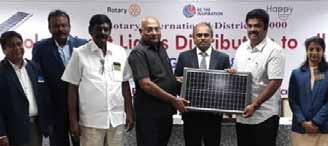
A general heath camp was organised in which elders were screened for various ailments. Free medicines were given after consultations.

Farm equipment, school bags and notebooks costing ` 34,000 were given to around 100 beneficiaries besides a plantation drive by the Rotarians in a neighbourhood which enhanced its public image.

A two-day youth conclave saw participation of over 400 students who were motivated by speakers and facilitators drawn from various fields. Project Chairman Dipesh Shah was supported by Co-chair Mahesh Bhanushali and Rtn Nirali Gajjar in organising the event. All participants were given certificates.
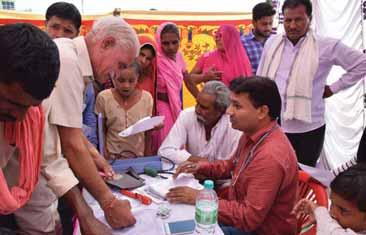
A cheque for `1 lakh each was given to families of Pulwama martyrs in Anandpur Sahib and Moga in Punjab and Kangra in Himachal Pradesh. This gesture is done to salute the jawans who had made supreme sacrifice for the nation.

The club organised its seventh health camp for this Rotary year at Mundia Ahmed Nagar village. Since 2002, regular camps are being held here benefitting the villagers.
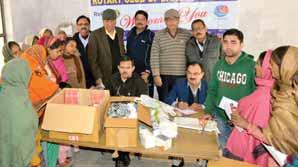
Around 50 women have turned literate at the Adult and Children Education Project being run at the Shiv Mandir in Aliganj for the last three years. All the beneficiaries were honoured at a special event.
A health camp was organised for children of sex workers in a neighbourhood colony. Rotarians distributed medicines, protein food, soap and oil, besides other eatables to the children.
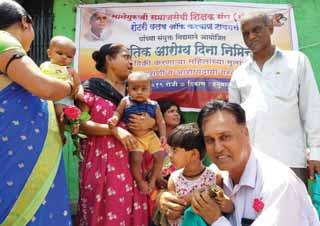
Rotarians distributed butter milk sachets to 10,000 visitors and tourists to beat the summer heat. The gesture created an impact and enhanced the image of Rotary among locals.
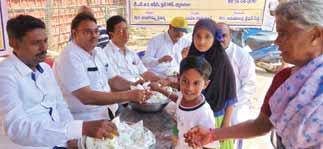
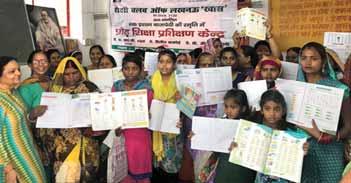
The club members, along with the Rotarians of RCs Karwar Seaside, Ankola, Ankola Rural, Gokarna, Kumta, Honnavar and Bhatkal undertook a 150 km-bike rally to create awareness on polio immunisation. Thirty Rotarians and Anns took off from Karwar and rode through scenic landscape of coastal Karnataka to spread Rotary’s message.
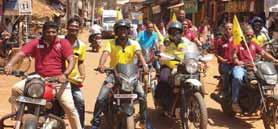
A passenger shelter was set up at the Udupi Railway station. Railway Regional Manager Balasaheb B Nikam inaugurated the facility built at a cost of `1.3 lakh. DGN Rajarama Bhat, AG Subbanna Pai and district’s Public Image Chairman Allen V Lewis were present on the occasion.
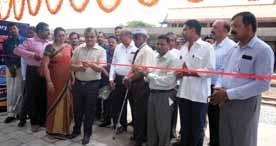
Two Smart Classrooms were inaugurated at the Panchayat Union Middle School in Saravanampatty village and the Government High School in Sellappanaikenpalayam village. More than 580 students from both the schools will benefit with this digital classroom which will enhance their learning experience.


A vehicle carrying relief material worth `8 lakh for the Gaja cyclone-affected victims at Patukkottai in Thanjavur district was flagged off by DG K Rajagopalan in the presence of PDG Joe Villavarayar and other Rotarians. The relief both in cash and kind were collected from the public and traders.

The club members visited an orphanage and presented gifts to the inmates. They cheered up the children with games and food.
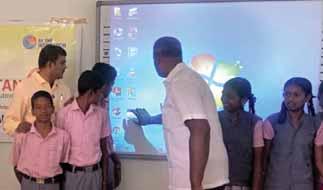
A toilet block for girl students at Meenakshi School, Anna Nagar West, was inaugurated by DG Babu Peram under the WinS project. The facility benefitting 400 girls was constructed under a global grant project led by RC Madras Coromandel.
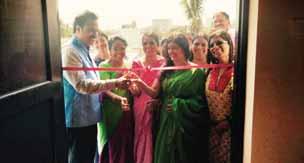
A water filter plant was installed at Ganganagri in the heart of the city near a park that was renovated by the club last year. The project cost `3 lakh and around 1,500 people are benefitted by this facility.

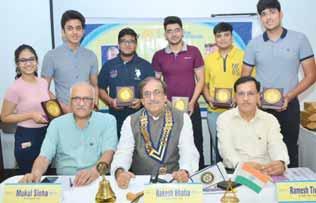
Under the Mission 1 Lakh project, the Rotarians are planting and distributing saplings in various villages and sensitising people on issues such as climate change and global warming. Over 90,000 saplings have been planted so far.
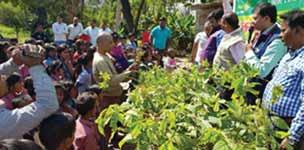
A welfare and development camp at a tribal village Nawargawan was organised with the support of the Information and Broadcasting officials. The camp benefitted 800 villagers.

Six students from Rotarian families were felicitated by DG Mukul Sinha for their meritorious performance in the School Board Exams. Mementoes were given to the awardees.
Compiled by V Muthukumaran Designed by L Gunasekaran

Sheela Nambiar
The new buzzword in the fitness industry is ‘MindBody’ exercise. This primarily includes yoga, pilates, Tai Chi, Qigong etc where the mindbody connection is unmistakable. The instructions are focused on the breath and a very deliberate association is made between breath and movement. The focus is on the mindfulness of the activity. Other forms of fitness don’t seem to make this connection quite so obviously. This false differentiation however makes it appear as if all other forms of fitness (like running, aerobic dance, strength training) do not involve the mind. This couldn’t be further from the truth. Every single form of exercise needs to be a mind-body activity.
mood, giving you clarity of thought and opening up your senses.
Weight training - Strength training, for instance, cannot be a mindless activity one participates in while having an animated conversation with a friend in the gym. There has to be total focus on the weight being used, the rhythm and pattern of breathing that has to follow the movement (exhaling during the effort for instance), the muscles being worked and the correct ‘form’ of the exercise. How can it not be a mind-body exercise then? If one is not mindful while training with weights, chances of injury are extremely high.


A major part of fitness is about the mind. Determination, cognition, motivation, perseverance and dedication. Qualities without which one cannot hope to persist with one’s fitness routine day after day. It may seem as if physical fitness is just that — a “physical” intervention. But it is not really completely physical, is it? There are times when the body is reluctant to complete that last mile, pick up the weights or go through a yoga routine. It is one’s mind that is then responsible for following through. It’s the mind that also responds to the workout in a positive way, enhancing

The breath is the essence of life, obviously, but I often see the gym rat glowing blue in the face as he/she tries to force a movement while simultaneously holding the breath and paying no attention to what the body is telling. Catastrophic! Even experienced exercisers and trainers constantly need to be reminded of their breathing pattern while training with weights. So the next time, instead of watching your neighbour in the gym, focus on your own breathing and exercise instead. Focus on which muscles in your body
are working to lift the weight. Focus on keeping your core stable, spine aligned and your body weight balanced evenly between your feet. Focus on what you are pushing your body to do. Listen to what it is telling you in response.
While building muscles, finishing those last few reps when your muscles are begging you to stop is possible only with the right mental attitude.






Cardio - Although some people enjoy their cardio, many find it extremely dreary and/or difficult. You can trick your mind into enjoying it by adding fun to the activity. If you cannot go for a run or use the cross trainer, why not try one of the new cardio classes with music and other exercisers that add to the thrill, making one forget the actual work done.
Here are some ways in which your mind is clearly called into play during a cardio routine:
— Memorising choreography in a class requires concentration of the mind
— You have to stay alert and aware through complicated classes — Pushing through the last few minutes or a challenging phase of a routine takes ‘will power’, a function of the brain.

learns to adapt to a new kind of movement. It learns to listen to and understand rhythm. All this is possible when the mind is alert. All this is also possible because the brain is capable of creating new networks with new stimulus. Brain Derived Neurotropic Factor (BDNF) that is released during exercise airs in neural growth and development. The release of endorphins during exercise changes the physiology of the brain making one more ‘open’, positive and in a better frame of mind.

The mind has to focus, learn and commit to memory when you are taken through a complicated aerobic/step/ kickboxing class with choreography and music. Yes your mind is working. There is no question about it. There are students who will swear they have two left feet, they are deaf and have no clue about music. Somehow, with practice, their body
Researchers (Kramer, Erickson and Colcombe, 2006; and Hillman and Van Prag, 2008) found that regular exercise creates new pathways, new cells (neurogenesis) and improved blood flow (vascularity) in the brain thereby improving cognition, multitasking even while dealing with ambiguity. Regular exercise increases decision-making ability, problem-solving capability, creativity and working memory. These functions normally decline with age. Regular exercise therefore could prevent this decline paving the way for a better quality of life. The mind is used to exercise effectively and exercise in turn improves brain function. All fitness activities have a mind-body connection. This is more palpable when one focuses on the activity in hand. When one is open to learning and understanding; and when one is conscious and mindful.
The author is a lifestyle medicine physician and can be contacted at sheela.nambiar@gmail.com. www.drsheelanambiar.com
Designed by N Krishnamurthy


You can pay the Rotary News / Rotary Samachar subscription online
Our Bank details:
Bank : HDFC Bank SB Account
Branch : Egmore, Chennai
A/c Name : Rotary News Trust
A/c No. : 50100213133460
IFSC Code : HDFC0003820
E mail us following details:
Name of Club
President/Secretary’s name
Amount/Date of transfer/UTR Number
For physical payment by cheque or cash in bank, write Club Name only without prefixing “Rotary club of”. Eg. Rotary Club of Delhi Central should be written: Delhi Central.
Rotary at a glance Rotarians : 1,222,446
: 538 *Rotaractors : 168,300
: 10,150
: 558,578
:




Author : Sabina Brennan
Publisher : Hachette India
Pages : 298; ` 499
The aim of living a brainhealthy life is not just to reduce the risk of dementia and other serious health issues but also to improve the quality of your life and brain performance NOW. The author, Sabina Brennan, provides all the essential information you need to make informed choices everyday about your sleeping, eating and lifestyle habits that will benefit all aspects of your life from work to relationships and help you achieve your personal goals.
This motivating book proves you don’t need to understand complicated neuroscience in order to look after your brain. Do at least one small thing every day to radically improve your brain health.


Author : Taran Matharu
Publisher : Hachette India
Pages : 408; `399
Enteran immersive world where the chosen few have the ability to summon demons...
In this thriller written by Taran Matharu, Arcturus is an ordinary orphaned stable boy when he discovers that he has the ability to summon demons from another world. He is sent to Vocans Academy where the lost arts of summoning, spell craft and demonology are taught to the noble children of the Empire.
As the first commoner gifted with this ability, his discovery challenges the nobility and the powers that be and Arcturus soon makes enemies. With no one but his demon Sacharissa by his side, Arcturus must prove himself as a worthy Summoner...
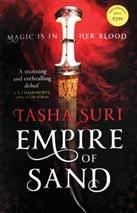


Author : Tasha Suri
Publisher : Hachette India
Pages : 432; `399
Empire of Sand is Tasha Suri’s captivating, Mughal Indiainspired debut fantasy. This novel revolves around Mehr, who lives in a world where she is only half accepted.
It is the tale of the Amrithi who are outcasts. Nomads who worship desert spirits, they are coveted and persecuted throughout the Empire for the power in their blood. Mehr is the illegitimate daughter of an imperial Ambhan governor and an exiled Amrithi mother she can barely remember, but whose face and magic she has inherited. The Ambhans conquer and destroy the Amrithi nomads, and as a woman with parents from both the worlds, she struggles to find her place as a worshipper of the old Amrithi gods and traditions. When the Emperor’s mystics take note of her Amrithi powers, they force her into a marriage with one of their own, and Mehr becomes a very important pawn in a deadly game of men, gods, and demons.
Compiled by Kiran Zehra
Designed by Krishnapratheesh S
Having always been fond of reading, I am constantly on the lookout for new authors. So recently I discovered a man called Roy Moxham. In 2002, he wrote a book about a hedge. Yes, a hedge. The book is called, rightly, “The Great Hedge of India”. Why would anyone write such a book? Well, it seems that in the latter part of the 19th century the English bandits who ruled India then built a 2,300-mile-long hedge to prevent smuggling of salt between British India and the Indian states. The smuggling happened because salt in British India cost at least five times as much, if not more because of British taxes on it. The hedge was 20 feet deep in some places and about that high as well.
The book also contains a detailed account of the history of salt taxes in India. They started during the Chandragupta Maurya’s time.
One day in 1994, Moxham discovered this long-forgotten nugget by accident. Piqued at how anyone could have thought this up, he decided to see if any of it was still left. So he turned up in India in 1996 and kept coming back until he found it five years later somewhere in UP. He has described his adventures in this book, including an incident when a crocodile turned up when he was taking a dip on the banks of a river.
The thing is, says Moxham, no one protested about these taxes until the avaricious criminals of the East India Company raised the rate a
The smuggling happened because salt in British India cost at least five times as much, if not more because of British taxes on it.
hundred-fold. And because they were pocketing the proceeds — a few billion pounds over 100 years from 1760 — the British government, which took over British India in 1860, decided to build the hedge because there was no money to build a wall. The customs department — corrupt as ever — built the hedge, complete with watch towers and little forts along its length. Their remnants is what Moxham found.
This crazy idea lasted for just a decade from 1879 to 1890 when it was abandoned. The man who made it truly affective was none other than the founder of the Congress party — Allan Octavian Hume. At its peak it wound its way from Multan all the way to Bihar. It is amazing that some villagers in UP remembered it when Moxham met them 120 years later. They said it was known as “parmat lane” (Permit Line) and took him to it. Moxham says he felt most gratified that a six-year-old search had come to fruition. He had gone to enormous pains over it while looking for old British customs maps.
But there are many such examples of English nuttiness. It is portrayed

as eccentricity now but it was never without a self-serving purpose. For example, the circuit houses and the dak bungalows they built in remote and picturesque places all over India had a hidden purpose as well, of clandestine liaisons when the memsahib was away in England. They serve the same purpose even now, I am told. The circuit houses were for the higher ranks and the dak bungalows for the lower ones in the middle of dense forests.
To add spice to all this there were some circuit houses and dak bungalows which came with a ghost attached, like the dak bungalow at Misrod near Bhopal. It seems one Miss Rod — Misrod, get it? — committed suicide there after her heart was broken by some Englishman. There is also circuit house near Jabalpur which was visited by an Englishman’s ghost over Christmas. He had killed himself out of sheer loneliness.
Much of all this was captured in a book on the Raj’s ‘babu’ resorts by Rajita Bhargava a few years ago. Like Moxham with the hedge, she decided to find out what these things were. Unfortunately, the book is out of print and I can’t remember its name.
In this context of British craziness, I must mention another book that I read some years ago. It is called The Fishing Fleet by Anne de Courcy. It is about the annual influx of English spinsters who came to India looking for a husband. It is a fascinating book about that period.

A 16-yearold girl killed herself in Malaysia, after posting a poll on her Instagram account asking followers “Really Important, Help Me Choose D/L”. After 69 per cent of her followers voted for “death”, she killed herself. A lawyer says those who voted for her to die could be guilty of abetting suicide.

The WHO, at the World Health Assembly, has recognised ‘gaming disorder’ as an illness, describing it as ‘a pattern of behaviour characterised by impaired control over gaming, increasing priority given to gaming over other activities to the extent that gaming takes precedence over other interests and daily activities.’ This will come into effect from Jan 1, 2022.
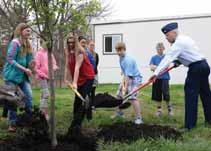
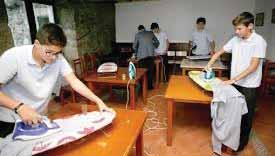
Colegia Montecastelo, a Spanish college, has introduced a mandatory subject titled Home Economics, through which boys are taught to cook, wash, iron and make their own beds. The move is aimed to promote gender equity and sensitise boys to the fact that performing household chores is not a ‘girl thing.’ The college expects the students to be fully independent and take care of themselves and their living space without external help.
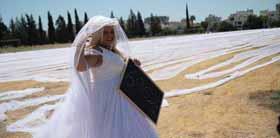
When Maria Paraskeva from Cyprus got married last year, she set a different kind of record… for wearing the longest wedding veil. This was her cherished childhood fantasy. The never-ending lace veil measuring 6,962.6 m (over 22,843 ft), or as long as 63.5 football fields, has got an entry into the Guinness World Records.
A new law in the Philippines requires school and college students to plant at least 10 trees if they want to graduate. The higher education department will be in charge of implementing the Bill. The plant species should be appropriate for the topography and climate of the area and planting done in protected areas, abandoned mining sites, mangroves and military ranges. The country’s forest cover has dropped to an alarming 20 per cent during the last century and if implemented properly, the initiative could result in at least 175 million trees planted every year.
Compiled by Jaishree and Kiran Zehra; Designed by Krishnapratheesh
Regn. No. TN/CCN/360/2018-2020
Licensed to post WPP No.TN/PMG(CCR)/WPP-431/2018-2020


Total number of pages in this monthly issue, including cover, 84. Price: `35
Registered with Registrar of News Papers for India 3880/57 Rotary News Published on 1st of every month






































